Chat Pile Masks b/w Sifting 7″ (Sub Pop)

The youth may not understand that it was once a thrilling honor to release a stand-alone seven-inch single on Sub Pop, but Chat Pile has not forgotten this! Most record shops don’t even have a box for new singles these days (a single tear rolls down a bald eagle’s cheek), but Chat Pile are hotter than jalapeños right now, with a hungry audience ready to follow, so if there’s ever a time for them to do this, it’s now. “Masks” behaves how you’d expect a noisy, sardonic, post-hardcore noise-rock band on Sub Pop to behave: a nostalgia rush with thoughts of Tad, The Fluid and Unsane. Unlike much of Chat Pile’s most recent output, it’s upbeat and you can bounce to it, coasting on a busy bass-line, big ugly tom-heavy drumming and a guitar that prefers needling single-notes over power chords. The final moments offer the cathartic breakdown we’ve come to expect from these Oklahomans, consistently imagining a Jonathan Davis without the redemption arc. In a move so obvious as to almost be surprising, they cover Nirvana on the b-side. “Sifting” off Bleach probably isn’t anyone’s favorite Nirvana song, but it’s ripe for Chat Pile’s violent fattening, dropping the tempo a smidge and flooding the zone with sludge. I’m picturing King Buzzo with grey-white dreadlocks down to his ass instead of his signature hairdo as I listen, and hopefully now you will too.
Gil.Barte Claviceps Purpurea LP (Teenage Menopause)
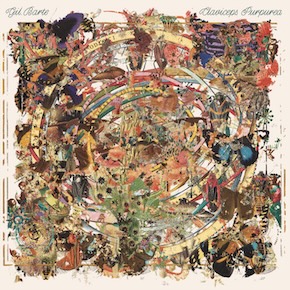 When it comes to menacing, low-BPM techno, Gil.Barte ranks high on my list. I somehow missed that this, his vinyl full-length debut came out last year, but I’ve learned a valuable lesson: pay extremely close attention to any label called Teenage Menopause Records. His EPs were sparse and glorious, and Claviceps Purpurea is a true full-length, offering eight robust tracks and over forty minutes of the French producer’s signature skulk. While the tenor remains subdued and brooding, he manages to avoid repeating himself without discarding what made his earlier work so exciting. The sound palette has widened, bringing in bass-guitars, grisly vocal samples, modular-synth interference and other forms of deliberate sonic shrapnel. It’s downright serpentine, though more in the spirit of a boa constrictor quietly digesting a sloth in the shade, less a cobra poised to strike. “Kobold” invokes the claustrophobic terror of being locked in a trunk, only this sedan isn’t speeding down the freeway, it’s slowly submerging into an unmarked pond. “Martha’s Doll” almost gets the party going, albeit a party on the fresh burial site of some superhuman AI server. Unlike many forms of goth-influenced or industrial techno, the darkness in Gil.Barte’s music is consistently fun, a gloomy delight akin to the silhouettes of Chris and Cosey cryptically gyrating from across the dungeon.
When it comes to menacing, low-BPM techno, Gil.Barte ranks high on my list. I somehow missed that this, his vinyl full-length debut came out last year, but I’ve learned a valuable lesson: pay extremely close attention to any label called Teenage Menopause Records. His EPs were sparse and glorious, and Claviceps Purpurea is a true full-length, offering eight robust tracks and over forty minutes of the French producer’s signature skulk. While the tenor remains subdued and brooding, he manages to avoid repeating himself without discarding what made his earlier work so exciting. The sound palette has widened, bringing in bass-guitars, grisly vocal samples, modular-synth interference and other forms of deliberate sonic shrapnel. It’s downright serpentine, though more in the spirit of a boa constrictor quietly digesting a sloth in the shade, less a cobra poised to strike. “Kobold” invokes the claustrophobic terror of being locked in a trunk, only this sedan isn’t speeding down the freeway, it’s slowly submerging into an unmarked pond. “Martha’s Doll” almost gets the party going, albeit a party on the fresh burial site of some superhuman AI server. Unlike many forms of goth-influenced or industrial techno, the darkness in Gil.Barte’s music is consistently fun, a gloomy delight akin to the silhouettes of Chris and Cosey cryptically gyrating from across the dungeon.
Hatihati Whip It / Head 12″ (Deewee)
 Recent trends in electronic music have veered toward quieter, background-safe sounds, where yoga studios and lush waterfalls morph into one holistic piece of Ezekiel bread. Perhaps that’s why I’m feeling so refreshed by the debut single from Hatihati, as these songs are designed to be experienced at a volume that renders conversation impossible. “Whip It” is something I want to experience with friends (and a couple enemies) in a crowded windowless room, unable to make out what we’re saying even when screaming in each others’ ears. It’s got a half-time stomping rhythm that I’d associate with the more ‘roided-up first-wave dubstep sound (think Benga, Kutz, Ed Solo), but it’s delivered through the millions of refracted rainbows that bounce off a smashed iPad screen (who needs a disco ball?). Not a DEVO cover, this track takes PC Music’s extreme digital elasticity and hangs some Truck Nutz from it, a Dragula that runs on cheap champagne, not zombie blood. “Head” remains in that same manic state but looks towards Ed Banger for inspiration, building up and knocking down a red-lining Mr. Oizo arpeggio with multiple voices enunciating “head” like Benny Benassi on the first bad trip of his life. Hedonistic, loud and probably a little stupid, Hatihati won’t inspire me to Jackass levels of self-harm buffoonery, but it might convince me to commingle my alcohol intake like a college freshman. Two white wines and a whiskey, please!
Recent trends in electronic music have veered toward quieter, background-safe sounds, where yoga studios and lush waterfalls morph into one holistic piece of Ezekiel bread. Perhaps that’s why I’m feeling so refreshed by the debut single from Hatihati, as these songs are designed to be experienced at a volume that renders conversation impossible. “Whip It” is something I want to experience with friends (and a couple enemies) in a crowded windowless room, unable to make out what we’re saying even when screaming in each others’ ears. It’s got a half-time stomping rhythm that I’d associate with the more ‘roided-up first-wave dubstep sound (think Benga, Kutz, Ed Solo), but it’s delivered through the millions of refracted rainbows that bounce off a smashed iPad screen (who needs a disco ball?). Not a DEVO cover, this track takes PC Music’s extreme digital elasticity and hangs some Truck Nutz from it, a Dragula that runs on cheap champagne, not zombie blood. “Head” remains in that same manic state but looks towards Ed Banger for inspiration, building up and knocking down a red-lining Mr. Oizo arpeggio with multiple voices enunciating “head” like Benny Benassi on the first bad trip of his life. Hedonistic, loud and probably a little stupid, Hatihati won’t inspire me to Jackass levels of self-harm buffoonery, but it might convince me to commingle my alcohol intake like a college freshman. Two white wines and a whiskey, please!
Mall Grab New York 12″ (Fragrance)
 There he is on the cover, the young bachelor Mall Grab, dazzled by the neon-light metropolitan bustle of The Big Apple, so very far from home (Australia by way of London). Will the city consume him, or will he rise to stardom? By whatever lucky break or concerted achievement, Mall Grab has become one of the rising names of mainstream-via-underground techno; for example, he’s the guy that Turnstile calls when they need a dance remix EP. (Steve Aoki would’ve been interested but he already slabbed all of his Turnstile collector vinyls, sorry.) New York offers another four cuts of extremely obvious main-stage techno, tastefully integrating trance signifiers and vocal Burialisms to songs that echo the ebullient party vibes of Robin S.’s “Show Me Love”. A typical jungle beat is smoothed over in “New York”, shapeshifting into a blissful tranquility worthy of a Kelly Lee Owens set. Mall Grab thrives in this zone, one where unambiguous techno party beats donk you on the head with hooks that are easy enough to sing along with (even if it’s your very first time hearing them). It’s probably one of the easiest forms of electronic dance music to hate, as Mall Grab holds a magnifying glass to techno’s most conspicuous qualities, but depending on your personal persuasion, also one of the easiest forms to love. I, for one, hope he makes it.
There he is on the cover, the young bachelor Mall Grab, dazzled by the neon-light metropolitan bustle of The Big Apple, so very far from home (Australia by way of London). Will the city consume him, or will he rise to stardom? By whatever lucky break or concerted achievement, Mall Grab has become one of the rising names of mainstream-via-underground techno; for example, he’s the guy that Turnstile calls when they need a dance remix EP. (Steve Aoki would’ve been interested but he already slabbed all of his Turnstile collector vinyls, sorry.) New York offers another four cuts of extremely obvious main-stage techno, tastefully integrating trance signifiers and vocal Burialisms to songs that echo the ebullient party vibes of Robin S.’s “Show Me Love”. A typical jungle beat is smoothed over in “New York”, shapeshifting into a blissful tranquility worthy of a Kelly Lee Owens set. Mall Grab thrives in this zone, one where unambiguous techno party beats donk you on the head with hooks that are easy enough to sing along with (even if it’s your very first time hearing them). It’s probably one of the easiest forms of electronic dance music to hate, as Mall Grab holds a magnifying glass to techno’s most conspicuous qualities, but depending on your personal persuasion, also one of the easiest forms to love. I, for one, hope he makes it.
Mandy, Indiana Urgh LP (Sacred Bones)
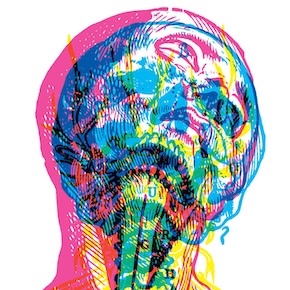 If you trash-compacted the two basic focal points of this blog – ugly guitar music and creative electronic music – the resulting mangled byproduct might resemble something like Manchester’s Mandy, Indiana. Their 2023 full-length debut arrived fully-formed, and Urgh upholds the strategy of absolutely jackhammering the drums, guitars, electronics and vocals wielded by this quartet. Manchester is a dance music town, but forget the typical club etiquette – Mandy, Indiana’s overtly electronic sounds necessitate mosh-pits full of art-damaged weaklings who don’t know how to mosh (always a beautiful sight). Their productions call back to a variety of aggressive, DIY electronic sounds (Nasenbluten, Doormouse, Blawan and Huren, let’s say), anti-social techno that reacted against friendly party people comfortably having fun. The guitar is harder to pick out among all the alarm-siren synths and pummeling beats, but it makes more sense as another chaotic texture than any sort of riff manufacturer anyway. I can’t imagine Mandy, Indiana will ever pursue the upper 250 BPMs of terror-core – they prefer slamming over thrashing – but aggression is key. They’d fit just as comfortably on stage alongside the STD electro of Sextile as one of Orchid’s (or Black Eyes’s) ongoing reunion gigs, which is a cool place to be. Urgh‘s a wild ride right through closer “I’ll Ask Her”, which conjures the street horror of Gazelle Twin’s Unflesh era, raw and sobering.
If you trash-compacted the two basic focal points of this blog – ugly guitar music and creative electronic music – the resulting mangled byproduct might resemble something like Manchester’s Mandy, Indiana. Their 2023 full-length debut arrived fully-formed, and Urgh upholds the strategy of absolutely jackhammering the drums, guitars, electronics and vocals wielded by this quartet. Manchester is a dance music town, but forget the typical club etiquette – Mandy, Indiana’s overtly electronic sounds necessitate mosh-pits full of art-damaged weaklings who don’t know how to mosh (always a beautiful sight). Their productions call back to a variety of aggressive, DIY electronic sounds (Nasenbluten, Doormouse, Blawan and Huren, let’s say), anti-social techno that reacted against friendly party people comfortably having fun. The guitar is harder to pick out among all the alarm-siren synths and pummeling beats, but it makes more sense as another chaotic texture than any sort of riff manufacturer anyway. I can’t imagine Mandy, Indiana will ever pursue the upper 250 BPMs of terror-core – they prefer slamming over thrashing – but aggression is key. They’d fit just as comfortably on stage alongside the STD electro of Sextile as one of Orchid’s (or Black Eyes’s) ongoing reunion gigs, which is a cool place to be. Urgh‘s a wild ride right through closer “I’ll Ask Her”, which conjures the street horror of Gazelle Twin’s Unflesh era, raw and sobering.
ÖPNV +4917635713990 LP (Phantom)
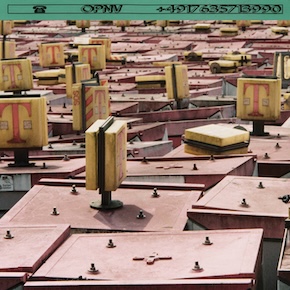 On their second full-length, Berliner punk roboter ÖPNV look towards our modern modes of communication with suspicion and disrespect. They’re pretty modern themselves, a trio that crafts their music using a variety of computer-based manipulations rather than your typical guitars and amps. They opt for real-sounding fake drums, synths on their most irritating settings, bass guitar and a whole ZIP file’s worth of sound-effects and samples. It’s the type of thing that could be as big of a presentation as DEVO at Coachella or as small as one lonely punk with a laptop and USB drive, but their mode of operation seems to fall somewhere in between. I’m reminded a lot of Heavy Metal (the band) in the way that the drums lend a sense of artificiality over shout-along choruses and mid-tempo hooks, and also in the way that samples are deployed as punchlines. A particular example can be found in “Sprechfunk”, which breaks for a pitched-down version of an incredibly familiar digital chime that’s been keeping me up at night until I can figure out where it’s from (AOL? The earliest iPhone? An AT&T busy signal? Help!). The a-side ends in a locked groove of an iPhone vibration, producing whatever panic endorphins that sound has trained in us… even the record cover’s endless field of T-Mobile boxes is some sort of commentary, I’m sure. It’s all in German, I should mention, but the seasick plink-plonk of “Kaputtnik” makes perfect sense to me: picture Abwärts spiraling into reduced service due to excessive data usage.
On their second full-length, Berliner punk roboter ÖPNV look towards our modern modes of communication with suspicion and disrespect. They’re pretty modern themselves, a trio that crafts their music using a variety of computer-based manipulations rather than your typical guitars and amps. They opt for real-sounding fake drums, synths on their most irritating settings, bass guitar and a whole ZIP file’s worth of sound-effects and samples. It’s the type of thing that could be as big of a presentation as DEVO at Coachella or as small as one lonely punk with a laptop and USB drive, but their mode of operation seems to fall somewhere in between. I’m reminded a lot of Heavy Metal (the band) in the way that the drums lend a sense of artificiality over shout-along choruses and mid-tempo hooks, and also in the way that samples are deployed as punchlines. A particular example can be found in “Sprechfunk”, which breaks for a pitched-down version of an incredibly familiar digital chime that’s been keeping me up at night until I can figure out where it’s from (AOL? The earliest iPhone? An AT&T busy signal? Help!). The a-side ends in a locked groove of an iPhone vibration, producing whatever panic endorphins that sound has trained in us… even the record cover’s endless field of T-Mobile boxes is some sort of commentary, I’m sure. It’s all in German, I should mention, but the seasick plink-plonk of “Kaputtnik” makes perfect sense to me: picture Abwärts spiraling into reduced service due to excessive data usage.
Simon Peter Souvenir 12″ (Is It Balearic?)
 Balearic music isn’t solely a dominion of silk shirts on the beach with all-you-can-eat shrimp cocktail, it’s also cable-knit sweaters on the ski chateau’s fireside bearskin rug. It’s an all-season appropriate vibe I’m picking up from Simon Peter’s buttery-smooth new EP, Souvenir. The title track sounds like a castaway from Universal Cave’s exquisite Soft Rock For Hard Times series, a simmering folksy strum over pristine synth arpeggios sure to unbutton every shirt in the room. Sumptuous! “Mystical Delight” follows with even more guitar, in league with Schoenherz’s “Sultry Nights” in both atmosphere and successful song-title manifestation. “Still Going” sways like a smoke break from Batteaux’s self-titled album, and while that’s more than my money’s worth, we also get two “Souvenir” remixes here, from both Peaking Lights and Coyote. Peaking Lights add some stardust, whereas labelheads Coyote go all Transfer Station Blue on their version… no matter what the weather is outside, the shower glass is fully steamed. You might think you caught a glance of Michael Douglas and Sharon Stone fight-humping through the penthouse window, but it’s only a souvenir…
Balearic music isn’t solely a dominion of silk shirts on the beach with all-you-can-eat shrimp cocktail, it’s also cable-knit sweaters on the ski chateau’s fireside bearskin rug. It’s an all-season appropriate vibe I’m picking up from Simon Peter’s buttery-smooth new EP, Souvenir. The title track sounds like a castaway from Universal Cave’s exquisite Soft Rock For Hard Times series, a simmering folksy strum over pristine synth arpeggios sure to unbutton every shirt in the room. Sumptuous! “Mystical Delight” follows with even more guitar, in league with Schoenherz’s “Sultry Nights” in both atmosphere and successful song-title manifestation. “Still Going” sways like a smoke break from Batteaux’s self-titled album, and while that’s more than my money’s worth, we also get two “Souvenir” remixes here, from both Peaking Lights and Coyote. Peaking Lights add some stardust, whereas labelheads Coyote go all Transfer Station Blue on their version… no matter what the weather is outside, the shower glass is fully steamed. You might think you caught a glance of Michael Douglas and Sharon Stone fight-humping through the penthouse window, but it’s only a souvenir…
Ravi Shavi Erase America LP (Almost Ready)
 Though Providence’s Ravi Shavi have consistently indulged in rock n’ roll revelry throughout their existence, they can’t help but comment on the shameful state of the nation with their newest full-length for the Almost Ready label, Erase America. The whole record is a righteous anti-American screed, but if you had some people over and weren’t paying close attention to the vocals, that point might evade you. The music remains feel-good, universally-familiar garage-punk in the vein of Ian Svenonius’s various projects (with a touch of Liars’ early dance-y post-punk style), with snappy and effective guitar licks and a peppy rhythm section to keep feet moving. Take a note of the content, however, and you’ll realize that Ravi Shavi is as rage-filled as these times necessitate: song titles like “Killer Whites”, “Fresh Hell”, “Intifada” and “New Brown Neighbors” don’t beat around the bush. Without a lyric sheet, I’m straining (and quite interested) to hear what Ravi Shavi have to say, even if the much-needed general sentiments are crystal clear – the repeated line “the motherland of killing another man” is unmistakable, at least. They take a break from all the black-pointy-shoe dancing with the groaning, decrepit dirge “Miracle Bombs”, whose mood certainly matches the experience of living through Trump’s second administration. It’s a nice breather before “Action” snaps us, James Chance-like, into motion. Even if their social analysis doesn’t go much deeper than the provocative song titles, it’s refreshing and comforting to see more punks kicking back in the face of naked fascism.
Though Providence’s Ravi Shavi have consistently indulged in rock n’ roll revelry throughout their existence, they can’t help but comment on the shameful state of the nation with their newest full-length for the Almost Ready label, Erase America. The whole record is a righteous anti-American screed, but if you had some people over and weren’t paying close attention to the vocals, that point might evade you. The music remains feel-good, universally-familiar garage-punk in the vein of Ian Svenonius’s various projects (with a touch of Liars’ early dance-y post-punk style), with snappy and effective guitar licks and a peppy rhythm section to keep feet moving. Take a note of the content, however, and you’ll realize that Ravi Shavi is as rage-filled as these times necessitate: song titles like “Killer Whites”, “Fresh Hell”, “Intifada” and “New Brown Neighbors” don’t beat around the bush. Without a lyric sheet, I’m straining (and quite interested) to hear what Ravi Shavi have to say, even if the much-needed general sentiments are crystal clear – the repeated line “the motherland of killing another man” is unmistakable, at least. They take a break from all the black-pointy-shoe dancing with the groaning, decrepit dirge “Miracle Bombs”, whose mood certainly matches the experience of living through Trump’s second administration. It’s a nice breather before “Action” snaps us, James Chance-like, into motion. Even if their social analysis doesn’t go much deeper than the provocative song titles, it’s refreshing and comforting to see more punks kicking back in the face of naked fascism.
Shackleton Euphoria Bound 2xLP (AD 93)
 Shaq’s back! The Berlin-based producer is one of the most singular electronic artists of this millennium (or any other, I suppose), and one of the busiest, too. Recent years have seen him focusing on collaborative efforts that run quite a creative range; I honestly forgot he did that album with Six Organs Of Admittance until looking it up again now (and it’s overdue for a spin). I always love Shackleton best when he’s freewheelin’ on his own, though, and Euphoria Bound is a thrilling distillation of the peculiar sonic aesthetic he’s carefully cultivated over the last couple decades. His music brandishes a ritualistic sci-fi slant, and it’s never been more focused than this double LP. These tracks sound like the work of advanced alien civilizations interpreting modern earthly club music. The time signatures and percussive elements are somewhat familiar to our human ears, but it’s the sum of Shackleton’s parts that dazzle. I understand that light speed exists, but I can’t grasp how exactly the Large Hadron Collider works, and the same could be said for Shackleton’s productions, as inventive and striking as body-moving, a full-bodied psychedelic fun. Man On A String Part 1 And 2 / Bastard Spirit and The Drawbar Organ EPs have been my personal faves for a minute, but the further I dip into Euphoria Bound, who knows what might happen…
Shaq’s back! The Berlin-based producer is one of the most singular electronic artists of this millennium (or any other, I suppose), and one of the busiest, too. Recent years have seen him focusing on collaborative efforts that run quite a creative range; I honestly forgot he did that album with Six Organs Of Admittance until looking it up again now (and it’s overdue for a spin). I always love Shackleton best when he’s freewheelin’ on his own, though, and Euphoria Bound is a thrilling distillation of the peculiar sonic aesthetic he’s carefully cultivated over the last couple decades. His music brandishes a ritualistic sci-fi slant, and it’s never been more focused than this double LP. These tracks sound like the work of advanced alien civilizations interpreting modern earthly club music. The time signatures and percussive elements are somewhat familiar to our human ears, but it’s the sum of Shackleton’s parts that dazzle. I understand that light speed exists, but I can’t grasp how exactly the Large Hadron Collider works, and the same could be said for Shackleton’s productions, as inventive and striking as body-moving, a full-bodied psychedelic fun. Man On A String Part 1 And 2 / Bastard Spirit and The Drawbar Organ EPs have been my personal faves for a minute, but the further I dip into Euphoria Bound, who knows what might happen…
Yorgos Stavridis Solo Percussion LP (Heat Crimes)
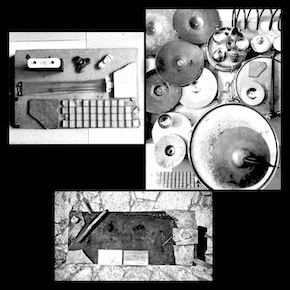 Cleve Pozar set the bar high with his own Solo Percussion album back in 1974, but Yorgos Stavridis is a worthy heir to the throne. It’s a genre I tend to enjoy – I kind of think every human has at least one good Solo Percussion buried within them – though Stavridis has clearly put a lot of thought and technique into the seven pieces here, performed and recorded live. I’d assume he was a traditionally-trained drummer at some point, based on the fluid wrist-action on opener “Pile Of”, but he delves deep into the very nature of sound itself as the album progresses. A wide variety of resonating surfaces are explored, resulting in a kaleidoscope of wicked timbres, unintuitive patterns and a general sense of the otherworldly existing within the quotidian. The simple chime of a bell is the focal point of “Clink”, which evolves into a paranoid, twinkling orchestra of one. “Cymbal Friction” takes the titular instrument and wrings a mesmerizing futurist drone out of it, uncovering unknown sounds buried deep within the copper alloy. Judging from the instruments (or fractured shards of instruments) on the cover, Stavridis relishes the chance to truly investigate sound from these likely and unlikely sources, and his findings are bold and engrossing.
Cleve Pozar set the bar high with his own Solo Percussion album back in 1974, but Yorgos Stavridis is a worthy heir to the throne. It’s a genre I tend to enjoy – I kind of think every human has at least one good Solo Percussion buried within them – though Stavridis has clearly put a lot of thought and technique into the seven pieces here, performed and recorded live. I’d assume he was a traditionally-trained drummer at some point, based on the fluid wrist-action on opener “Pile Of”, but he delves deep into the very nature of sound itself as the album progresses. A wide variety of resonating surfaces are explored, resulting in a kaleidoscope of wicked timbres, unintuitive patterns and a general sense of the otherworldly existing within the quotidian. The simple chime of a bell is the focal point of “Clink”, which evolves into a paranoid, twinkling orchestra of one. “Cymbal Friction” takes the titular instrument and wrings a mesmerizing futurist drone out of it, uncovering unknown sounds buried deep within the copper alloy. Judging from the instruments (or fractured shards of instruments) on the cover, Stavridis relishes the chance to truly investigate sound from these likely and unlikely sources, and his findings are bold and engrossing.
Strange Program Strange Program LP (Bumbo)
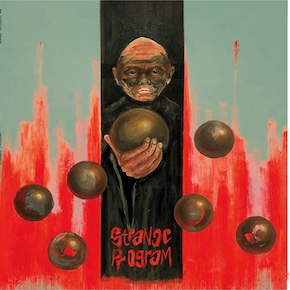 “Detroit Psych Mutation” says the sticker on the sleeve, three words almost as satisfying as “peanut butter chocolate”. Strange Program are a rock trio featuring members of Druid Perfume, Red Red Red and Bumbo’s Tinto Brass Band, and their particular mutation is easy on the ears, the work of seasoned rockers who know how to squeeze the sweetest juice out of their sound. There’s plenty of auxiliary weirdness, usually in the form of Looney Tunes-esque percussive elements, and the songs themselves seem easily distracted, prone to veering off course. It’s like one member makes a funny face, let’s say bassist Bumbo Krawczyk, and the other two guys notice and momentarily forget where they’re at, but in a good way. Even if it feels like they may dip into the same pouch of magical substances as Lavender Flu (or even Timmy’s Organism), Strange Program never loses the script, an album whose maturity is evident even amidst brash and kooky behavior. It’s the sort of thing that In The Red Records usually likes to invest its hard-earned dollars in, and perhaps might someday in the future. I could easily imagine the album resonating with the many King Gizzard fans that apparently walk among us, what with the penchant for abusing Van Halen-esque riffs, a sense of wide-eyed rock n’ roll adventure and some good-natured clownery, too. For so many things, Detroit is where it’s at.
“Detroit Psych Mutation” says the sticker on the sleeve, three words almost as satisfying as “peanut butter chocolate”. Strange Program are a rock trio featuring members of Druid Perfume, Red Red Red and Bumbo’s Tinto Brass Band, and their particular mutation is easy on the ears, the work of seasoned rockers who know how to squeeze the sweetest juice out of their sound. There’s plenty of auxiliary weirdness, usually in the form of Looney Tunes-esque percussive elements, and the songs themselves seem easily distracted, prone to veering off course. It’s like one member makes a funny face, let’s say bassist Bumbo Krawczyk, and the other two guys notice and momentarily forget where they’re at, but in a good way. Even if it feels like they may dip into the same pouch of magical substances as Lavender Flu (or even Timmy’s Organism), Strange Program never loses the script, an album whose maturity is evident even amidst brash and kooky behavior. It’s the sort of thing that In The Red Records usually likes to invest its hard-earned dollars in, and perhaps might someday in the future. I could easily imagine the album resonating with the many King Gizzard fans that apparently walk among us, what with the penchant for abusing Van Halen-esque riffs, a sense of wide-eyed rock n’ roll adventure and some good-natured clownery, too. For so many things, Detroit is where it’s at.
Terrine Jazz Band Theory LP (Bruit Direct Disques)
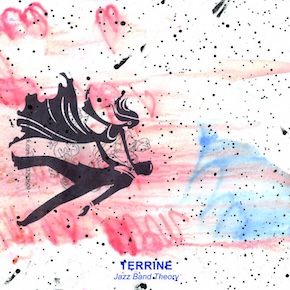 The last time I put on Jazz Band Theory, I was already nursing a raging headache, essentially beating Terrine to the punch. Across four full-lengths for Bruit Direct, the solo project of one Claire Gapenne continues to confound in ways that only the most dedicated of self-punishing experimental music lovers (such as myself, and at least some of you) will savor. Jazz Band Theory is Terrine’s newest excavation into the deepest recesses of her mind, body and hard-drive, with multiple incongruous parts fused into stand-alone “tracks” by a logic inaccessible to this writer. A majority chunk of this record comes across like cinema vérité of an electronics repair shop on the busiest day of their year. Take a broken drum machine, twiddle its knobs a bit, then take that recording and chop it into little digital snippets… then cut-and-paste it wildly across your DAW of choice. Occasionally things will cohere into what one might call a groove (a minute into “Weekly Vlog”, for example), but you’re just as likely to be left stranded in a field of dying consumer electronics without plot or context. Unlike prior outings that offered some obscure thread to be followed, Terrine’s experiments here recall the deep abstractionism of folks like Vertonen, Irr. App. (Ext.) and Joe Colley, but even those artists tend to settle into an idea and carve a safe-space from within it. Just when you think you can relax into a rally of malfunctioning beats, Terrine will whip out an acoustic guitar, or a piano, and remind you that you’re never safe in her world of sound.
The last time I put on Jazz Band Theory, I was already nursing a raging headache, essentially beating Terrine to the punch. Across four full-lengths for Bruit Direct, the solo project of one Claire Gapenne continues to confound in ways that only the most dedicated of self-punishing experimental music lovers (such as myself, and at least some of you) will savor. Jazz Band Theory is Terrine’s newest excavation into the deepest recesses of her mind, body and hard-drive, with multiple incongruous parts fused into stand-alone “tracks” by a logic inaccessible to this writer. A majority chunk of this record comes across like cinema vérité of an electronics repair shop on the busiest day of their year. Take a broken drum machine, twiddle its knobs a bit, then take that recording and chop it into little digital snippets… then cut-and-paste it wildly across your DAW of choice. Occasionally things will cohere into what one might call a groove (a minute into “Weekly Vlog”, for example), but you’re just as likely to be left stranded in a field of dying consumer electronics without plot or context. Unlike prior outings that offered some obscure thread to be followed, Terrine’s experiments here recall the deep abstractionism of folks like Vertonen, Irr. App. (Ext.) and Joe Colley, but even those artists tend to settle into an idea and carve a safe-space from within it. Just when you think you can relax into a rally of malfunctioning beats, Terrine will whip out an acoustic guitar, or a piano, and remind you that you’re never safe in her world of sound.
The Velvet Underground Sunday’s Clown LP (no label)
 There are many forms of musical nerdery of which I’m willing to accept some amount of personal complicity, but in all honesty, “live bootleg enthusiast” isn’t one of them, classic-rock or otherwise. There’s a certain sort of musical-scientist type who savors the ability to deconstruct and evaluate the myriad subtle differences in live renditions by Neil Young or whatever, but I ain’t one of ’em. That said, when a man in a fedora, black sunglasses and a buttoned-up trenchcoat slid me this new Velvet Underground boot tucked surreptitiously into a folded copy of the Provincetown Independent, I wasn’t going to ignore it on account of some self-imposed rule. If there’s one worthy exception to the “no live bootleg” stance, it’s gotta be the Velvets, whose Quine Tapes and Sweet Sister Ray went on to inspire countless underground rockers (many of whom I adore). This newly pressed set, taken from a summer 1966 performance in Provincetown, MA, sticks out to me for two reasons: one, the inclusion of the never-properly-released original “I’m Not A Young Man Anymore”, and two, the performances’ enthusiastic descriptions on the back cover, providing insight into the material from the rabid obsessed-fan perspective (so we don’t have to rabidly obsess ourselves). To some, it might sound like Velvet Underground classics performed through an old drainpipe, which is fine on its own merit; to others, this is another crucial piece of the puzzle, like a crystal urn hunted down by Indiana Jones.
There are many forms of musical nerdery of which I’m willing to accept some amount of personal complicity, but in all honesty, “live bootleg enthusiast” isn’t one of them, classic-rock or otherwise. There’s a certain sort of musical-scientist type who savors the ability to deconstruct and evaluate the myriad subtle differences in live renditions by Neil Young or whatever, but I ain’t one of ’em. That said, when a man in a fedora, black sunglasses and a buttoned-up trenchcoat slid me this new Velvet Underground boot tucked surreptitiously into a folded copy of the Provincetown Independent, I wasn’t going to ignore it on account of some self-imposed rule. If there’s one worthy exception to the “no live bootleg” stance, it’s gotta be the Velvets, whose Quine Tapes and Sweet Sister Ray went on to inspire countless underground rockers (many of whom I adore). This newly pressed set, taken from a summer 1966 performance in Provincetown, MA, sticks out to me for two reasons: one, the inclusion of the never-properly-released original “I’m Not A Young Man Anymore”, and two, the performances’ enthusiastic descriptions on the back cover, providing insight into the material from the rabid obsessed-fan perspective (so we don’t have to rabidly obsess ourselves). To some, it might sound like Velvet Underground classics performed through an old drainpipe, which is fine on its own merit; to others, this is another crucial piece of the puzzle, like a crystal urn hunted down by Indiana Jones.
White Cross Fascist 7″ (Beach Impediment)
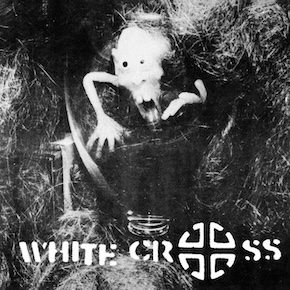 A faithful reissue of White Cross’s debut EP has been overdue for a while, so let’s thank the good brothers over at Beach Impediment for making it happen. The label has never been short on Virginia hardcore pride, and White Cross may very well be the hardcore-punk band most worthy of that pride (sorry, Avail!). As for this reissue, it’s appealingly faithful to the original design, with that great cover imagery that appears to be piles of hair and a rubber finger puppet on a Xerox machine. Who knows for sure? As for the music, White Cross raged with the best of ’em, a youthful thrash in league with their DC neighbors and, if you sped up 95 North for another five hours, Mutha’s mutant menagerie. I will forever experience a brief moment of disorientation when someone says “hardcore” in reference to stuff like E-Town Concrete or Code Orange, as I’m already too well trained to the textbook formula as rendered by White Cross’s eight songs here. I’m never going to listen to a word Jeff Bale has to say, but he got it right back in his Maximumrocknroll review of Fascist in 1982: “they’ve got that extra intensity which separates great thrash from the increasingly common generic variety.”
A faithful reissue of White Cross’s debut EP has been overdue for a while, so let’s thank the good brothers over at Beach Impediment for making it happen. The label has never been short on Virginia hardcore pride, and White Cross may very well be the hardcore-punk band most worthy of that pride (sorry, Avail!). As for this reissue, it’s appealingly faithful to the original design, with that great cover imagery that appears to be piles of hair and a rubber finger puppet on a Xerox machine. Who knows for sure? As for the music, White Cross raged with the best of ’em, a youthful thrash in league with their DC neighbors and, if you sped up 95 North for another five hours, Mutha’s mutant menagerie. I will forever experience a brief moment of disorientation when someone says “hardcore” in reference to stuff like E-Town Concrete or Code Orange, as I’m already too well trained to the textbook formula as rendered by White Cross’s eight songs here. I’m never going to listen to a word Jeff Bale has to say, but he got it right back in his Maximumrocknroll review of Fascist in 1982: “they’ve got that extra intensity which separates great thrash from the increasingly common generic variety.”
Future Left Behind compilation LP (Second Street)
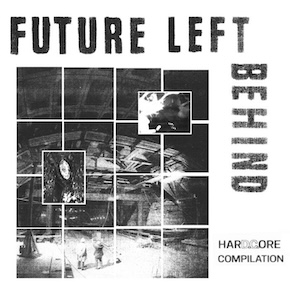 The return of carefully-produced regional compilations would be a welcome corrective to our flattened digital listening experience. What better way to fight back against the contextless deluge of surprise-free content than a record made by a flourishing punk community in celebration of itself? Not every city is lucky enough to have a record shop as culturally nourishing as DC’s Joint Custody, but we can certainly learn from how they’re doing it there: in service of people, not algorithms. Future Left Behind features fourteen tracks by fourteen different hardcore bands, all recorded in Joint Custody after business hours (and where exactly, I don’t know – does their basement space have its own additional basement??). Fans of American hardcore might recognize names like Protester, Laughing Corpse and Brain Tourniquet, but like a true classic hardcore comp, it’s probably a band you’ve never heard of before that’ll end up being your favorite. Whereas DC hardcore might conjure certain adjectives – let’s say emotional, self-serious, thoughtful, chiding – Future Left Behind leans in a crustier, more raging direction. There certainly aren’t any capital-H careerists here, only do-it-together punks who mosh with love because the music inspires it, not hate because the meathead singer ordered you to. I thought the Brain Tourniquet song is pretty ace (written on the drums first in what must’ve been some sort of mean-spirited prank against the other band members); Deliriant Nerve’s gurgle-throat grind was a treat as well, and Grand Scheme continue to make me want to throttle my best friend by his hoodie until the neck is stretched. What’s your scene like?
The return of carefully-produced regional compilations would be a welcome corrective to our flattened digital listening experience. What better way to fight back against the contextless deluge of surprise-free content than a record made by a flourishing punk community in celebration of itself? Not every city is lucky enough to have a record shop as culturally nourishing as DC’s Joint Custody, but we can certainly learn from how they’re doing it there: in service of people, not algorithms. Future Left Behind features fourteen tracks by fourteen different hardcore bands, all recorded in Joint Custody after business hours (and where exactly, I don’t know – does their basement space have its own additional basement??). Fans of American hardcore might recognize names like Protester, Laughing Corpse and Brain Tourniquet, but like a true classic hardcore comp, it’s probably a band you’ve never heard of before that’ll end up being your favorite. Whereas DC hardcore might conjure certain adjectives – let’s say emotional, self-serious, thoughtful, chiding – Future Left Behind leans in a crustier, more raging direction. There certainly aren’t any capital-H careerists here, only do-it-together punks who mosh with love because the music inspires it, not hate because the meathead singer ordered you to. I thought the Brain Tourniquet song is pretty ace (written on the drums first in what must’ve been some sort of mean-spirited prank against the other band members); Deliriant Nerve’s gurgle-throat grind was a treat as well, and Grand Scheme continue to make me want to throttle my best friend by his hoodie until the neck is stretched. What’s your scene like?
Quick note! Starting later this month, instead of sharing thirty reviews at once, I’m going to share fifteen twice a month – on the first and the fifteenth. Same amount of content, just hopefully more digestible (and without that pesky “[Message clipped] View entire message” cut-off, for those who also choose to read via the Substack version). If you hate this change, email me and I can give you a specific list of the people who assured me that it’s a good idea, but I am confident this slight format alteration is for the best. -ed.
Ajukaja Sunda School IV 7″ (Porridge Bullet)
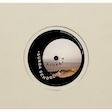 Got so into the Porridge Bullet label over the last few years that I recently went to an author event solely because, like the label, the author was Estonian. I asked him if he was aware of Porridge Bullet, hoping for some new nugget of info, to which he responded with gentle confusion. Rather than learn from this incident – maybe not every random person out there is obsessed with the niche electronic labels of their home country? – I’ve decided that the writer in question needs to do a better job representing Estonia, and that I was perfectly in the right to bring it up immediately after saying hello. Ajukaja has been working with the label since day one (2012) and his latest contribution to the Sunda School series is blissfully baked. Both songs were made on a Yamaha organ at an “island sanctuary on Hiiumaa” and if you’re prone to fits of jealousy, I advise against Googling the island. “Sunda School 3” is elevator music for an elevator that takes you to paradise, festooned with the Mediterranean breeze of Domenique Dumont and the cutesy charm of Katamari Damacy. “Sunda School 4” dims the house lights, as it is now the evening and everyone at the private resort has changed into their finest outfits, feeling confident and breezy following the afternoon’s open bar. Ajukaja offers an alternate vision of chill-wave here, one where jazz-funk melodies dance like candle flames, free from the clumsy baggage of blurry reverb or overt nostalgic winks.
Got so into the Porridge Bullet label over the last few years that I recently went to an author event solely because, like the label, the author was Estonian. I asked him if he was aware of Porridge Bullet, hoping for some new nugget of info, to which he responded with gentle confusion. Rather than learn from this incident – maybe not every random person out there is obsessed with the niche electronic labels of their home country? – I’ve decided that the writer in question needs to do a better job representing Estonia, and that I was perfectly in the right to bring it up immediately after saying hello. Ajukaja has been working with the label since day one (2012) and his latest contribution to the Sunda School series is blissfully baked. Both songs were made on a Yamaha organ at an “island sanctuary on Hiiumaa” and if you’re prone to fits of jealousy, I advise against Googling the island. “Sunda School 3” is elevator music for an elevator that takes you to paradise, festooned with the Mediterranean breeze of Domenique Dumont and the cutesy charm of Katamari Damacy. “Sunda School 4” dims the house lights, as it is now the evening and everyone at the private resort has changed into their finest outfits, feeling confident and breezy following the afternoon’s open bar. Ajukaja offers an alternate vision of chill-wave here, one where jazz-funk melodies dance like candle flames, free from the clumsy baggage of blurry reverb or overt nostalgic winks.
Arson Burning Future 7″ (General Speech)
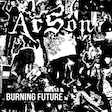 Like the multitudes of letter-swapping hardcore brethren, they could’ve went with Arzon, or Arsyn, but NYC crusters Arson are keeping things spellcheck-safe on their vinyl debut. The four-piece found a comfortable home with the General Speech label, whose Japanese-leaning hardcore-punk tastes align nicely with Arson’s blatantly non-commercial music. In that regard, Arson do come across as a bit of a Japanese noise-core tribute act (presumably on purpose), following the footsteps of Gloom (whose “Disgust” they go so far as to cover here), Abraham Cross, Zyanose and Exit-Hippies’ more straightforward material. The hand-lettering and Anime-inspired band illustration drive this point home, though thankfully Arson doesn’t resort to the worst form of Japanese hardcore worship: fake ESL song titles (though there is no insert to confidently verify the same for their lyrics – I’m giving ’em the benefit of the doubt). On one hand, blatantly lifting and replicating other punks’ original ideas is wack, but on the other hand, if you’re going to copy something, it might as well be some of the most blistering and unhinged hardcore-punk that has ever existed. By that metric, Arson undeniably rip, from the guitar’s scalding treble overload to the vocals, which sound like attack-dogs barking and snarling through a helicopter’s in-flight intercom system.
Like the multitudes of letter-swapping hardcore brethren, they could’ve went with Arzon, or Arsyn, but NYC crusters Arson are keeping things spellcheck-safe on their vinyl debut. The four-piece found a comfortable home with the General Speech label, whose Japanese-leaning hardcore-punk tastes align nicely with Arson’s blatantly non-commercial music. In that regard, Arson do come across as a bit of a Japanese noise-core tribute act (presumably on purpose), following the footsteps of Gloom (whose “Disgust” they go so far as to cover here), Abraham Cross, Zyanose and Exit-Hippies’ more straightforward material. The hand-lettering and Anime-inspired band illustration drive this point home, though thankfully Arson doesn’t resort to the worst form of Japanese hardcore worship: fake ESL song titles (though there is no insert to confidently verify the same for their lyrics – I’m giving ’em the benefit of the doubt). On one hand, blatantly lifting and replicating other punks’ original ideas is wack, but on the other hand, if you’re going to copy something, it might as well be some of the most blistering and unhinged hardcore-punk that has ever existed. By that metric, Arson undeniably rip, from the guitar’s scalding treble overload to the vocals, which sound like attack-dogs barking and snarling through a helicopter’s in-flight intercom system.
Shinichi Atobe SynthScale 12″ (Plastic & Sounds)
 Shinichi Atobe has a fun backstory: for years following his 2001 debut EP, people had assumed he must’ve been an alias of someone else, as he had only delivered that sole fantastic twelve-inch on the revered Chain Reaction label before quietly disappearing into the techno ether. The Demdike Stare guys made contact some thirteen years later, only to discover that he never stopped making tunes, merely for his own private satisfaction. With a trove of unreleased material and a steady stream of new tracks, Atobe has been back on the scene with a consistent, workmanlike output ever since. SynthScale is his newest EP, released on his new Plastic & Sounds label, and if you ever felt intimidated by the breadth of Atobe’s output, I urge you to shed your worries and step right in: the water’s warm! Atobe works within the well-established confines of dub-techno, but he treats the genre as a playground, not a holding cell. “SynthScale” is clinical and invigorating, like the best and deepest remix of Kraftwerk’s “The Robots” buried on some Euro-only promotional mix CD. “Disappear” twinkles and bleeps like a wine bar on the moon, though “Between Thoughts” is my favorite of the EP, its separate parts sequenced together elegantly, a punchy little up-and-down arpeggio energized under the shimmering pads; ten minutes of pulsating bliss. The entire EP is top-notch, another exquisite missive from this fascinating producer who best communicates through music. (Peep his Tone Glow interview to see what I mean – it was like pulling teeth!)
Shinichi Atobe has a fun backstory: for years following his 2001 debut EP, people had assumed he must’ve been an alias of someone else, as he had only delivered that sole fantastic twelve-inch on the revered Chain Reaction label before quietly disappearing into the techno ether. The Demdike Stare guys made contact some thirteen years later, only to discover that he never stopped making tunes, merely for his own private satisfaction. With a trove of unreleased material and a steady stream of new tracks, Atobe has been back on the scene with a consistent, workmanlike output ever since. SynthScale is his newest EP, released on his new Plastic & Sounds label, and if you ever felt intimidated by the breadth of Atobe’s output, I urge you to shed your worries and step right in: the water’s warm! Atobe works within the well-established confines of dub-techno, but he treats the genre as a playground, not a holding cell. “SynthScale” is clinical and invigorating, like the best and deepest remix of Kraftwerk’s “The Robots” buried on some Euro-only promotional mix CD. “Disappear” twinkles and bleeps like a wine bar on the moon, though “Between Thoughts” is my favorite of the EP, its separate parts sequenced together elegantly, a punchy little up-and-down arpeggio energized under the shimmering pads; ten minutes of pulsating bliss. The entire EP is top-notch, another exquisite missive from this fascinating producer who best communicates through music. (Peep his Tone Glow interview to see what I mean – it was like pulling teeth!)
Bruce The Hand 12″ (Poorly Knit)
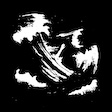 Bristol’s Bruce is an electronic outsider among outsiders, having cut his teeth with the exemplary Hessle Audio scene before wandering off to wherever it is he is now. He dropped three different DIY-assembled EPs on his new Poorly Knit label in 2025, and The Hand is the most recent; like the first two, it’s unpredictable and great. “Golden Water Queen” brings his singing voice back to the forefront, but with a freewheeling, improvising-in-the-shower feel, his processed vocals pirouetting over some murky electronics, like Reckonwrong if he possessed a darker side. “The Hand” is tentative, beatless and nervous, as if Andy Stott suddenly developed a case of stage fright in the middle of a performance. Bruce brings lots of different energies to his most recent productions, and this is a new one. He saved his rhythms for “DHam’s Jam”, eight minutes of minimal tech-house chop with plenty of off-the-cuff interference. The track behaves like it’s bobbing and weaving past pedestrians on a crowded street in hopes of catching the bus. Bruce’s mind is everywhere, and considering his Hessle Audio pedigree, I’m surprised that it doesn’t really seem like much of that corner of the music world is noticing. You can still pick up all three vinyl EPs in a discounted Bandcamp bundle, which I recommend – with enough buzz, maybe someday Jeremy Allen White will play this Bruce too.
Bristol’s Bruce is an electronic outsider among outsiders, having cut his teeth with the exemplary Hessle Audio scene before wandering off to wherever it is he is now. He dropped three different DIY-assembled EPs on his new Poorly Knit label in 2025, and The Hand is the most recent; like the first two, it’s unpredictable and great. “Golden Water Queen” brings his singing voice back to the forefront, but with a freewheeling, improvising-in-the-shower feel, his processed vocals pirouetting over some murky electronics, like Reckonwrong if he possessed a darker side. “The Hand” is tentative, beatless and nervous, as if Andy Stott suddenly developed a case of stage fright in the middle of a performance. Bruce brings lots of different energies to his most recent productions, and this is a new one. He saved his rhythms for “DHam’s Jam”, eight minutes of minimal tech-house chop with plenty of off-the-cuff interference. The track behaves like it’s bobbing and weaving past pedestrians on a crowded street in hopes of catching the bus. Bruce’s mind is everywhere, and considering his Hessle Audio pedigree, I’m surprised that it doesn’t really seem like much of that corner of the music world is noticing. You can still pick up all three vinyl EPs in a discounted Bandcamp bundle, which I recommend – with enough buzz, maybe someday Jeremy Allen White will play this Bruce too.
Cracked Actor Nazi School LP (Last Laugh)
 After that 2010 repressing of Negative Approach’s debut EP, I assumed we all learned our lesson to never, ever airbrush, Photoshop or colorize iconic hardcore / punk cover art, but I’m looking at the slightly-enhanced cover of this Cracked Actor reissue, and you know what? It’s tastefully done. Last Laugh has long been a reliable source for archival punk obscurities, and this LP collects the Killed By Death-immortalized Nazi School single along with a handful of other 1981 originals, previously relegated to a Japanese-issue CD from 2010 (punk historian voice: as was the style at the time). I have such a soft-spot for punk like this, where the general reactionary sense of the music was in full-effect but not yet codified, as evidenced by Cracked Actor’s Twisted Sister haircuts (maybe it was a Long Island thing). “Nazi School” remains a classic, and while the rest of these songs probably aren’t quite at that level (a couple even veer in that “Michael J. Fox playing Chuck Berry” direction), I can’t imagine ever being offered the chance to listen to Cracked Actor and refusing. “Epileptic Fit” will appeal to fans of GG Allin’s earliest singles, no doubt! I also love when bands did their own “radio commercials” back then, and there’s a perfectly stupid one here, replete with fake German accent (really leaning into their hit single, it would see). Who’s gonna do a comp of all the radio commercial spots townie punk bands made for themselves? Seems like a job for Last Laugh if there ever was one.
After that 2010 repressing of Negative Approach’s debut EP, I assumed we all learned our lesson to never, ever airbrush, Photoshop or colorize iconic hardcore / punk cover art, but I’m looking at the slightly-enhanced cover of this Cracked Actor reissue, and you know what? It’s tastefully done. Last Laugh has long been a reliable source for archival punk obscurities, and this LP collects the Killed By Death-immortalized Nazi School single along with a handful of other 1981 originals, previously relegated to a Japanese-issue CD from 2010 (punk historian voice: as was the style at the time). I have such a soft-spot for punk like this, where the general reactionary sense of the music was in full-effect but not yet codified, as evidenced by Cracked Actor’s Twisted Sister haircuts (maybe it was a Long Island thing). “Nazi School” remains a classic, and while the rest of these songs probably aren’t quite at that level (a couple even veer in that “Michael J. Fox playing Chuck Berry” direction), I can’t imagine ever being offered the chance to listen to Cracked Actor and refusing. “Epileptic Fit” will appeal to fans of GG Allin’s earliest singles, no doubt! I also love when bands did their own “radio commercials” back then, and there’s a perfectly stupid one here, replete with fake German accent (really leaning into their hit single, it would see). Who’s gonna do a comp of all the radio commercial spots townie punk bands made for themselves? Seems like a job for Last Laugh if there ever was one.
Creative Writing Baby Did This LP (Meritorio)
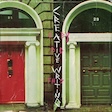 What’s a more hated college course than creative writing… Econ 101? I’d imagine that this Western Mass quartet suffered through a number of those morning seminars themselves, but they’re having the last laugh with their easy-going, homework-optional band. Featuring folks from Estrogen Highs, Sore Eros, Huevos II and other even-more-unsung indie-rock groups, Creative Writing know what they’re doing on their debut, Baby Did This. It’s indie-rock with power-pop, country-folk and post-punk flourishes in the proud American tradition. I think of Pavement, Teenage Fanclub, Wilco and other ’90s cult classics who looked toward Neil Young, The Velvet Underground and Big Star instead of Metallica or Minor Threat for post-adolescent inspiration. It’s pretty edgeless stuff, by design… the guitars chime and volley, the tempos are insufficient for jogging (or even power-walking), and the vocals are exceedingly polite. There’s probably some sarcasm in there, but Creative Writing play it so straight that any sort of pointed jab or sign of discontent goes right over my head, coasting on a wave of their affable jangle-pop. Of course, that could just be an insecure projection. Maybe they’re nothing but sincere? Maybe they actually enjoyed creative writing?
What’s a more hated college course than creative writing… Econ 101? I’d imagine that this Western Mass quartet suffered through a number of those morning seminars themselves, but they’re having the last laugh with their easy-going, homework-optional band. Featuring folks from Estrogen Highs, Sore Eros, Huevos II and other even-more-unsung indie-rock groups, Creative Writing know what they’re doing on their debut, Baby Did This. It’s indie-rock with power-pop, country-folk and post-punk flourishes in the proud American tradition. I think of Pavement, Teenage Fanclub, Wilco and other ’90s cult classics who looked toward Neil Young, The Velvet Underground and Big Star instead of Metallica or Minor Threat for post-adolescent inspiration. It’s pretty edgeless stuff, by design… the guitars chime and volley, the tempos are insufficient for jogging (or even power-walking), and the vocals are exceedingly polite. There’s probably some sarcasm in there, but Creative Writing play it so straight that any sort of pointed jab or sign of discontent goes right over my head, coasting on a wave of their affable jangle-pop. Of course, that could just be an insecure projection. Maybe they’re nothing but sincere? Maybe they actually enjoyed creative writing?
Forming Division Bring Them Down / Move 7″ (Total Life Society)
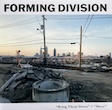 How many middle-aged indieheads would trade in their life savings (four hundred dollars) for the chance to be in a band with J Mascis or Mike Watt, let alone both? And yet that’s the dream that Matthew Wascovich is living, fronting these two legends (with John Moloney on drums!) in Forming Division. The band may or may not exist beyond this sole seven-inch single, but wait, Wascovich has also released singles on his Total Life Society label by Vicious Fence (he sings, with the one and only Mark Arm on guitar) and Subterranean Clocks (he sings, Watt’s back on bass and Brendan Canty plays drums!)? What’s next for Wascovich, a band with Jon Wurster, Bob Mould and Josephine Wiggs? I don’t know if Wascovich has some sort of blackmail dossier on these guys, or six-figure checks with which to lure them – or maybe, just maybe, he’s simply a great guy to be around and start bands with – but whatever the case, he’s like the modern-day Hugh Hefner of seminal ’90s underground-rock bunnies. Back to this single: “Bring Them Down” is a simmering shuffle featuring Mascis’s incessant soloing and a cool stop-start beat from Moloney; “Move” crawls by comparison, with Watt showing goodnatured restraint as Mascis continues to have a field day shredding. Wascovich kinda sings like a regular guy they randomly pulled in off the street, and not just in comparison to these indie heavyweights, which brings a level of relatability to the project (if also further confusion as to how he ended up in this covetable position). He has a cool deal going, and I’m not just saying that in hopes of being asked to play bass in a hypothetical new band he’s starting with Kim Thayil (though, if he was interested, I am available…)
How many middle-aged indieheads would trade in their life savings (four hundred dollars) for the chance to be in a band with J Mascis or Mike Watt, let alone both? And yet that’s the dream that Matthew Wascovich is living, fronting these two legends (with John Moloney on drums!) in Forming Division. The band may or may not exist beyond this sole seven-inch single, but wait, Wascovich has also released singles on his Total Life Society label by Vicious Fence (he sings, with the one and only Mark Arm on guitar) and Subterranean Clocks (he sings, Watt’s back on bass and Brendan Canty plays drums!)? What’s next for Wascovich, a band with Jon Wurster, Bob Mould and Josephine Wiggs? I don’t know if Wascovich has some sort of blackmail dossier on these guys, or six-figure checks with which to lure them – or maybe, just maybe, he’s simply a great guy to be around and start bands with – but whatever the case, he’s like the modern-day Hugh Hefner of seminal ’90s underground-rock bunnies. Back to this single: “Bring Them Down” is a simmering shuffle featuring Mascis’s incessant soloing and a cool stop-start beat from Moloney; “Move” crawls by comparison, with Watt showing goodnatured restraint as Mascis continues to have a field day shredding. Wascovich kinda sings like a regular guy they randomly pulled in off the street, and not just in comparison to these indie heavyweights, which brings a level of relatability to the project (if also further confusion as to how he ended up in this covetable position). He has a cool deal going, and I’m not just saying that in hopes of being asked to play bass in a hypothetical new band he’s starting with Kim Thayil (though, if he was interested, I am available…)
Gaute Granli Rosacea LP (Nashazphone)
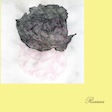 Still hurts to remember that Ghédalia Tazartès no longer walks among us mortals, but his spirit lives on in many forms. One of them is Norwegian artist Gaute Granli, who, much like Tazartès, forges his own distinctive sonic path, unconcerned with listener comfort or conventional musical methods, even by “experimental” standards. His work was last reviewed in these pages back in 2018, on the Jandek-meets-Severed Heads outer limits of Animalskt, and while Rosacea is clearly the work of the very same Gaute Granli (could there be more than one person on Earth with that name?), it’s by no means a retread. These songs, while still sounding as though they were cobbled together from the bits and pieces other musicians discarded, favor sweeter melodies, softer textures and brighter hopes. It’s full of the spirit of weird, singular artists who never quite got their due – J.D. Emmanuel, John T. Gast, Autre Ne Veut, Richard Youngs, Lewis, most certainly his Rump State bandmate Mark Morgan – with the sense that Granli hasn’t chosen to create these messed-up albums, but was compelled by forces outside his control. Take “This Is Never Ending”, which sounds like a mens’ church choir rehearsing inside Jabba the Hutt’s intestines, or “Carmelade”, which forefronts some Tarzan-like devotional singing over a synthesizer’s three warbling notes and an eventual off-time bass kick. We are peering directly into Granli’s cracked-open skull, and it’s full of writhing, colorful worms.
Still hurts to remember that Ghédalia Tazartès no longer walks among us mortals, but his spirit lives on in many forms. One of them is Norwegian artist Gaute Granli, who, much like Tazartès, forges his own distinctive sonic path, unconcerned with listener comfort or conventional musical methods, even by “experimental” standards. His work was last reviewed in these pages back in 2018, on the Jandek-meets-Severed Heads outer limits of Animalskt, and while Rosacea is clearly the work of the very same Gaute Granli (could there be more than one person on Earth with that name?), it’s by no means a retread. These songs, while still sounding as though they were cobbled together from the bits and pieces other musicians discarded, favor sweeter melodies, softer textures and brighter hopes. It’s full of the spirit of weird, singular artists who never quite got their due – J.D. Emmanuel, John T. Gast, Autre Ne Veut, Richard Youngs, Lewis, most certainly his Rump State bandmate Mark Morgan – with the sense that Granli hasn’t chosen to create these messed-up albums, but was compelled by forces outside his control. Take “This Is Never Ending”, which sounds like a mens’ church choir rehearsing inside Jabba the Hutt’s intestines, or “Carmelade”, which forefronts some Tarzan-like devotional singing over a synthesizer’s three warbling notes and an eventual off-time bass kick. We are peering directly into Granli’s cracked-open skull, and it’s full of writhing, colorful worms.
Gumm Beneath The Wheel LP (Convulse)
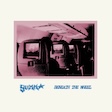 So this group is Gumm, from Chattanooga, TN, not GUNN from Orange County, nor are they to be confused with the Berlin punk band Gum. This is the sort of intensive cognitive testing that should keep me nice and dementia-free well into my nineties, so I thank the hardcore-punk scene’s endless similar iterations for keeping my brain on its toes. Beneath The Wheel arrives in a haze of feedback, with a modern-typical stompy riff opening up the horseshoe pit in a manner redolent of the typical three-letter suspects (Gel, Bib, Spy). This particular hardcore style completely exhausts me at this point, but mercifully it’s merely one piece of Gumm’s puzzle. Instead, they lean heavily into an upbeat and polished hardcore style ala Paint It Black and the first few Militarie Gun records, just one Strung Out drum-beat from verging on Strike Anywhere’s territory. By third track “Flavorless”, Gumm’s guitars are fully limber and melodic, a lively antidote to the stale down-picked half-step style I’ve come to dread. Vocalist Drew Waldon really comes across as a younger Dr. Dan Yemin here, full-throttle screaming enunciated so well that you won’t need a lyric sheet to follow along. Gumm are clearly trying to write their own songs rather than reconfigure someone else’s, and it leads to stuff like “Human Web”, a song that eventually builds to its own righteous sing-along chorus. For semi-enlightened hardcore kids looking for a path that doesn’t lead to E-Town Concrete or IDLES, Gumm offer an appealing alternative.
So this group is Gumm, from Chattanooga, TN, not GUNN from Orange County, nor are they to be confused with the Berlin punk band Gum. This is the sort of intensive cognitive testing that should keep me nice and dementia-free well into my nineties, so I thank the hardcore-punk scene’s endless similar iterations for keeping my brain on its toes. Beneath The Wheel arrives in a haze of feedback, with a modern-typical stompy riff opening up the horseshoe pit in a manner redolent of the typical three-letter suspects (Gel, Bib, Spy). This particular hardcore style completely exhausts me at this point, but mercifully it’s merely one piece of Gumm’s puzzle. Instead, they lean heavily into an upbeat and polished hardcore style ala Paint It Black and the first few Militarie Gun records, just one Strung Out drum-beat from verging on Strike Anywhere’s territory. By third track “Flavorless”, Gumm’s guitars are fully limber and melodic, a lively antidote to the stale down-picked half-step style I’ve come to dread. Vocalist Drew Waldon really comes across as a younger Dr. Dan Yemin here, full-throttle screaming enunciated so well that you won’t need a lyric sheet to follow along. Gumm are clearly trying to write their own songs rather than reconfigure someone else’s, and it leads to stuff like “Human Web”, a song that eventually builds to its own righteous sing-along chorus. For semi-enlightened hardcore kids looking for a path that doesn’t lead to E-Town Concrete or IDLES, Gumm offer an appealing alternative.
K9 Thrills LP (Who Ya Know)
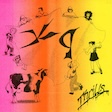 Nothing wrong with a lil’ tie-dyed punk rock! K9 are a new Richmond group, and while clearly punk in ethos and approach, don’t expect any bondage pants or liberty spikes from their full-length debut. Their ideas seem to spring from a similar well as that of Meat Puppets, or Hüsker Dü, or Chronophage, or even Milk Music / Mystic 100s (had they not wandered off on that endless ayahuasca trip). In other words, their music calls to mind the optimistic promise of independent college-rock in the mid ’80s, where trembling vocals, guitar jangle, jazzy drumming and psychedelic elements could be harvested for novel use. When only the dumbest punks were still punks and everyone else was hoping to find a fresh direction forward (even if it meant thrash-metal), the desire to differentiate oneself was inevitable for the art-minded and curious. Though K9 were probably children when Layne Staley died (let alone when Meat Puppets and Sonic Youth toured together), I sense a trans-generational likemindedness that results in some great tunes here. Thrills balances upbeat rockers (“95x”, “Who Ya Know”) with mid-tempo pop (“A Race”, “Arms Fall Off”) comfortably, an easy-listen that’s just the right amount of dirty: a little ripeness without the stink.
Nothing wrong with a lil’ tie-dyed punk rock! K9 are a new Richmond group, and while clearly punk in ethos and approach, don’t expect any bondage pants or liberty spikes from their full-length debut. Their ideas seem to spring from a similar well as that of Meat Puppets, or Hüsker Dü, or Chronophage, or even Milk Music / Mystic 100s (had they not wandered off on that endless ayahuasca trip). In other words, their music calls to mind the optimistic promise of independent college-rock in the mid ’80s, where trembling vocals, guitar jangle, jazzy drumming and psychedelic elements could be harvested for novel use. When only the dumbest punks were still punks and everyone else was hoping to find a fresh direction forward (even if it meant thrash-metal), the desire to differentiate oneself was inevitable for the art-minded and curious. Though K9 were probably children when Layne Staley died (let alone when Meat Puppets and Sonic Youth toured together), I sense a trans-generational likemindedness that results in some great tunes here. Thrills balances upbeat rockers (“95x”, “Who Ya Know”) with mid-tempo pop (“A Race”, “Arms Fall Off”) comfortably, an easy-listen that’s just the right amount of dirty: a little ripeness without the stink.
K/S/R Already In Heaven LP (Physical / Gilgongo)
 One of the most valuable skills an artist can wield these days is the ability to command the attention of a prospective audience. I’d like to commend free-improv trio K/S/R on doing so with their album cover here: this freaky posse posing in a cave with accordion, chain, violin and Morbid Angel t-shirt are enticing! They look like if Wolf Eyes got to cast a Scooby-Doo remake with a cast of trip-metal enthusiasts, and the hype sticker promises experimental music from an intriguing “New Mexico / Hudson Valley” axis. Do they split they difference and hang out in southern Indiana? There was so much to think about before I even put the record on, and now that I’m spinning it, I am afforded plenty of space to do such thinking. The trio of Justin Clifford Rhody, Abigail Smith and Ben Kujawski leave delicate touches through these five improvised pieces – if they were crime scenes, you’d have trouble pulling a full set of prints. Various forms of strings are lightly rubbed and plucked, keys are tickled with feathers, and it hovers in that mode, incapable of waking any nearby sleeping babies. I kept waiting for a powder keg to explode, for a shriek to pierce the gloomy din – any sort of reaction against the primordial stasis of their sound – but it never arrived. Their cover photo displays three prospective party animals, but Already In Heaven is the most docile form of noise – a forehead passed out on the keys, a light snore reverberating against the lower bout of a nearby violin.
One of the most valuable skills an artist can wield these days is the ability to command the attention of a prospective audience. I’d like to commend free-improv trio K/S/R on doing so with their album cover here: this freaky posse posing in a cave with accordion, chain, violin and Morbid Angel t-shirt are enticing! They look like if Wolf Eyes got to cast a Scooby-Doo remake with a cast of trip-metal enthusiasts, and the hype sticker promises experimental music from an intriguing “New Mexico / Hudson Valley” axis. Do they split they difference and hang out in southern Indiana? There was so much to think about before I even put the record on, and now that I’m spinning it, I am afforded plenty of space to do such thinking. The trio of Justin Clifford Rhody, Abigail Smith and Ben Kujawski leave delicate touches through these five improvised pieces – if they were crime scenes, you’d have trouble pulling a full set of prints. Various forms of strings are lightly rubbed and plucked, keys are tickled with feathers, and it hovers in that mode, incapable of waking any nearby sleeping babies. I kept waiting for a powder keg to explode, for a shriek to pierce the gloomy din – any sort of reaction against the primordial stasis of their sound – but it never arrived. Their cover photo displays three prospective party animals, but Already In Heaven is the most docile form of noise – a forehead passed out on the keys, a light snore reverberating against the lower bout of a nearby violin.
Maraudeur Flaschenträger LP (Feel It)
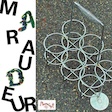 Feel It continues its stranglehold on the world’s supply of slippy slappy dancey post-punk, now claiming one of the Europe’s finest: Maraudeur. I keep hoping to one day see someone confuse them with NYHC legends Merauder – an accidental swapping of festival bookings, perhaps? – but for now, this group’s various European vowels have kept them safe from any hard pitting. Maraudeur have been at it since the mid ’10s, though I am relieved to report that they do not seem to have honed any new musical skills or impressive chops in that time. In fact, I’d say that the songs of Flaschenträger are more aimless than anything they’ve done – they sound like if Erase Errata or Priests simply stopped writing their songs halfway through, and went and recorded what they’ve got anyway. It’s beautiful in that regard, to hear carefree post-punk like this… pieces of The Raincoats and The Cure just kinda jumbled on the table, songs as likely to dig in their heels as trail off absentmindedly. There’s gotta be a secret method to this madness, though – how else to explain the inclusion of a “secret” final track, or at least that thirty second gap of silence before it? Just when you think you know where they’re headed, whoop! You got meraudeured.
Feel It continues its stranglehold on the world’s supply of slippy slappy dancey post-punk, now claiming one of the Europe’s finest: Maraudeur. I keep hoping to one day see someone confuse them with NYHC legends Merauder – an accidental swapping of festival bookings, perhaps? – but for now, this group’s various European vowels have kept them safe from any hard pitting. Maraudeur have been at it since the mid ’10s, though I am relieved to report that they do not seem to have honed any new musical skills or impressive chops in that time. In fact, I’d say that the songs of Flaschenträger are more aimless than anything they’ve done – they sound like if Erase Errata or Priests simply stopped writing their songs halfway through, and went and recorded what they’ve got anyway. It’s beautiful in that regard, to hear carefree post-punk like this… pieces of The Raincoats and The Cure just kinda jumbled on the table, songs as likely to dig in their heels as trail off absentmindedly. There’s gotta be a secret method to this madness, though – how else to explain the inclusion of a “secret” final track, or at least that thirty second gap of silence before it? Just when you think you know where they’re headed, whoop! You got meraudeured.
Method Of Doubt Total Soul Ignition 7″ (Scheme)
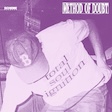 The “(Noun) Of (Noun)” hardcore band-naming convention continues to wreak havoc on society, but at least Method Of Doubt had the good sense to come up with an EP title cool enough to print on a t-shirt all by itself. This Florida hardcore band clearly worships at the altar of New Age Records, and while that’s far from my favorite era of hardcore, I hold respect for anyone who chooses to wear a XXL band t-shirt with a Krishna bead necklace while getting all emotional about how straight-edge they are. That’s the aura of these four songs, which balance the urban groove of early ’90s NYHC with the sluggish tempos of Outspoken and Chokehold. Method Of Doubt carry the introspection of Bold and the passion of Unbroken, and when vocalist Liam Quinn pleads the line “I will not assist with your genocide”, his frustration reads understandably sincere. For all the chugga-chugga ignorant-beatdown hardcore hypnotizing the youth, my ears are open for “mature” hardcore such as Total Soul Ignition (read: hardcore made by 24 year-olds instead of 18 year-olds). Their earnest presentation and emotional (but not emo) delivery is well suited to this most holy of hardcore formats, the seven-inch EP, not merely alive but thriving on CT’s Scheme Records.
The “(Noun) Of (Noun)” hardcore band-naming convention continues to wreak havoc on society, but at least Method Of Doubt had the good sense to come up with an EP title cool enough to print on a t-shirt all by itself. This Florida hardcore band clearly worships at the altar of New Age Records, and while that’s far from my favorite era of hardcore, I hold respect for anyone who chooses to wear a XXL band t-shirt with a Krishna bead necklace while getting all emotional about how straight-edge they are. That’s the aura of these four songs, which balance the urban groove of early ’90s NYHC with the sluggish tempos of Outspoken and Chokehold. Method Of Doubt carry the introspection of Bold and the passion of Unbroken, and when vocalist Liam Quinn pleads the line “I will not assist with your genocide”, his frustration reads understandably sincere. For all the chugga-chugga ignorant-beatdown hardcore hypnotizing the youth, my ears are open for “mature” hardcore such as Total Soul Ignition (read: hardcore made by 24 year-olds instead of 18 year-olds). Their earnest presentation and emotional (but not emo) delivery is well suited to this most holy of hardcore formats, the seven-inch EP, not merely alive but thriving on CT’s Scheme Records.
Nohz Slumber Between Rotten Walls LP (Kick Rock / World Gone Mad / Croux)
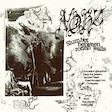 I love when hardcore and punk bands are clearly a product of their own direct and distinct communities, like how early ’80s DC hardcore only sounds like DC hardcore, or how those NWI punk bands from ten years ago created the egg-punk sound. Nohz are from Toulouse, France, however their brand of blackened hardcore-punk could’ve come from anywhere on the planet in the past ten years. Over aggressive polka-beat drumming and unfriendly down-picked guitars, the vocals arrive on bat-wings, with a daisy chain of effects pedals that render even the most casual scream into a cacophonous echo from the depths of Hades. It’s anti-social black-metal aesthetics grafted onto hardcore flesh, in a manner pretty consistent with Destino Final, Bone Awl and much of Youth Attack’s 2010s: a theatrical nihilism that’s mostly for titillation purposes. Nothing wrong with it, I suppose – there’s no faulting Nohz’s delivery of the goods here – but this internet-propagated sound has reached levels of over-saturation, a stylistic cul-de-sac we continue to circle. Unless your singer is that guy from Lancaster, PA who just got arrested for stealing a hundred skeletons from the graveyard (look it up!), or your songs are absolutely blistering and unmatched, I find myself feeling more placated than inspired by the current (and surely future) bands pursuing this particular style.
I love when hardcore and punk bands are clearly a product of their own direct and distinct communities, like how early ’80s DC hardcore only sounds like DC hardcore, or how those NWI punk bands from ten years ago created the egg-punk sound. Nohz are from Toulouse, France, however their brand of blackened hardcore-punk could’ve come from anywhere on the planet in the past ten years. Over aggressive polka-beat drumming and unfriendly down-picked guitars, the vocals arrive on bat-wings, with a daisy chain of effects pedals that render even the most casual scream into a cacophonous echo from the depths of Hades. It’s anti-social black-metal aesthetics grafted onto hardcore flesh, in a manner pretty consistent with Destino Final, Bone Awl and much of Youth Attack’s 2010s: a theatrical nihilism that’s mostly for titillation purposes. Nothing wrong with it, I suppose – there’s no faulting Nohz’s delivery of the goods here – but this internet-propagated sound has reached levels of over-saturation, a stylistic cul-de-sac we continue to circle. Unless your singer is that guy from Lancaster, PA who just got arrested for stealing a hundred skeletons from the graveyard (look it up!), or your songs are absolutely blistering and unmatched, I find myself feeling more placated than inspired by the current (and surely future) bands pursuing this particular style.
No Idols No Idols 7″ (Iron Lung)
 After being accidentally exposed to the Hardlore podcast’s “best ’00s hardcore band” competitive bracket, I needed something to quell my nausea, so I quickly threw on this debut seven-inch from Baltimore’s No Idols. These five songs coated my stomach with time-tested American hardcore-punk and I immediately snapped back into shape, ran outside and did a hundred shirtless pushups in the street. They’ve got that early Fucked Up songwriting style (see “Ballad Of A Fool” in particular) mixed with the formative bite of Last Rights and an aesthetic approach similar to some of the finer purveyors of hardcore in the ’00s, such as Waste Management, 86 Mentality and Knife Fight. The drums sound fantastic, especially when drummer Robin Zeijlon gets to tear it up on all those toms, pushing things to a level of intensity in league with Poison Idea at their (literal) heaviest. No Idols aren’t doing anything new here, so much as chasing the platonic ideal of hardcore-punk, one far removed from the pro-core, merch-team, beat-em-up nonsense that is somehow thriving now more than ever. You might not be able to beat ’em, but we certainly don’t have to join ’em, especially knowing that raging hardcore such as No Idols continues to sprout like weeds through the cracks in our increasingly corporate-reliant underground.
After being accidentally exposed to the Hardlore podcast’s “best ’00s hardcore band” competitive bracket, I needed something to quell my nausea, so I quickly threw on this debut seven-inch from Baltimore’s No Idols. These five songs coated my stomach with time-tested American hardcore-punk and I immediately snapped back into shape, ran outside and did a hundred shirtless pushups in the street. They’ve got that early Fucked Up songwriting style (see “Ballad Of A Fool” in particular) mixed with the formative bite of Last Rights and an aesthetic approach similar to some of the finer purveyors of hardcore in the ’00s, such as Waste Management, 86 Mentality and Knife Fight. The drums sound fantastic, especially when drummer Robin Zeijlon gets to tear it up on all those toms, pushing things to a level of intensity in league with Poison Idea at their (literal) heaviest. No Idols aren’t doing anything new here, so much as chasing the platonic ideal of hardcore-punk, one far removed from the pro-core, merch-team, beat-em-up nonsense that is somehow thriving now more than ever. You might not be able to beat ’em, but we certainly don’t have to join ’em, especially knowing that raging hardcore such as No Idols continues to sprout like weeds through the cracks in our increasingly corporate-reliant underground.
Emmett O.C. 9 From The Warped Mind LP (Sweet Time / Low Ambition)
 Sorry to disappoint, but this isn’t a tribute to the greatest west-coast teen drama of the early ’00s: this man’s full name is Emmett O’Connor, and he’s played in a variety of underground Cleveland punk bands you probably haven’t heard of (MK Ultras, Archie & The Bunkers, etc.). He’s stepping out here on his own, looking like a dashing ’50s greaser on the cover (or, some could argue, a twink heartthrob of the mid 2020s). I assumed he’d give us some form of punk, and voila: this solo-project follows the common path of vocals over drum machines and synths, the cheaper-sounding the better. An extremely low-fidelity affair, picture if you will an egg-punk John Maus excitedly crooning over chintzy gear on the street outside of Goner Fest to the bemusement of all passersby. The punker / sharper tunes resonate with me the most, whereas I find the doo-wop inspired tracks (proof of his greaser bonafides) least palatable, no matter how many Cindy Lee fans out there want to argue otherwise. It’s not a new thing to holler “one two fuck you” over a peppy drum-machine beat and monotonous synths, but “The Air Conditioning Is Making Me Sick” is up there with Buck Biloxi as far as enraged-yet-futile solo punk-rock is concerned. I like my one-man-band garage-punks like my Negronis: bitter as hell.
Sorry to disappoint, but this isn’t a tribute to the greatest west-coast teen drama of the early ’00s: this man’s full name is Emmett O’Connor, and he’s played in a variety of underground Cleveland punk bands you probably haven’t heard of (MK Ultras, Archie & The Bunkers, etc.). He’s stepping out here on his own, looking like a dashing ’50s greaser on the cover (or, some could argue, a twink heartthrob of the mid 2020s). I assumed he’d give us some form of punk, and voila: this solo-project follows the common path of vocals over drum machines and synths, the cheaper-sounding the better. An extremely low-fidelity affair, picture if you will an egg-punk John Maus excitedly crooning over chintzy gear on the street outside of Goner Fest to the bemusement of all passersby. The punker / sharper tunes resonate with me the most, whereas I find the doo-wop inspired tracks (proof of his greaser bonafides) least palatable, no matter how many Cindy Lee fans out there want to argue otherwise. It’s not a new thing to holler “one two fuck you” over a peppy drum-machine beat and monotonous synths, but “The Air Conditioning Is Making Me Sick” is up there with Buck Biloxi as far as enraged-yet-futile solo punk-rock is concerned. I like my one-man-band garage-punks like my Negronis: bitter as hell.
Officer John The Return Of Officer John 12″ (Wah Wah Wino)
 Wah Wah Wino have been on a prolonged hot-streak, so why not throw their hat into the Trip-Hop Olympics with Officer John? It’s trendy without a doubt, but Wah Wah Wino has broken enough fresh new ground to dispel any initial cynicism. The label continues to reveal Ireland’s underground music scene as diverse and innovative, and while The Return Of Officer John does not break new ground, it’s another winner all the same. The Officer John moniker is allegedly that of one Niall Rogers, but based on Wah Wah Wino’s track record of their artists being something like 75% real people, who can really say? What I do know is that his music is supremely vibes-based, baggy trip-hop and ’00s chill-wave colliding like a warm tongue on a perfect scoop of ice cream. The typical trip-hop beats come from airy, live-sounding drums, over which neo-new age guitars chime soothingly. Rogers’s voice is appropriately tuneful-yet-incomprehensible (a dream-pop requisite), like Thom Yorke trapped in a well (if only that were truly the case!). It’s post-Washed Out indie with a club-music mindset – rather than a band waiting for some DJs to remix their shoegaze tracks into dance hits, Officer John cuts to the chase. Morgan Buckley actually steps up to the plate with a remix of EP-opener “Stay” to close things out, refracting Officer John’s pastel colors into an even wider spectrum of sway-able grooves care of some extra-funky bongos and bells. Mr. Buckley, you’re well on your way to becoming this generation’s Fatboy Slim, and I am here for it.
Wah Wah Wino have been on a prolonged hot-streak, so why not throw their hat into the Trip-Hop Olympics with Officer John? It’s trendy without a doubt, but Wah Wah Wino has broken enough fresh new ground to dispel any initial cynicism. The label continues to reveal Ireland’s underground music scene as diverse and innovative, and while The Return Of Officer John does not break new ground, it’s another winner all the same. The Officer John moniker is allegedly that of one Niall Rogers, but based on Wah Wah Wino’s track record of their artists being something like 75% real people, who can really say? What I do know is that his music is supremely vibes-based, baggy trip-hop and ’00s chill-wave colliding like a warm tongue on a perfect scoop of ice cream. The typical trip-hop beats come from airy, live-sounding drums, over which neo-new age guitars chime soothingly. Rogers’s voice is appropriately tuneful-yet-incomprehensible (a dream-pop requisite), like Thom Yorke trapped in a well (if only that were truly the case!). It’s post-Washed Out indie with a club-music mindset – rather than a band waiting for some DJs to remix their shoegaze tracks into dance hits, Officer John cuts to the chase. Morgan Buckley actually steps up to the plate with a remix of EP-opener “Stay” to close things out, refracting Officer John’s pastel colors into an even wider spectrum of sway-able grooves care of some extra-funky bongos and bells. Mr. Buckley, you’re well on your way to becoming this generation’s Fatboy Slim, and I am here for it.
Probleman Eg Vannæ Plantæ Sjøl Om Di E Død LP (Banditt Media)
 One of the Bandcamp tags for Norweigian emo-punk group Probleman’s newest album, the I-don’t-even-wanna-attempt-it Eg Vannæ Plantæ Sjøl Om Di E Død, is “fifth wave emo”. Fifth wave – really?? There’s probably a terrible YouTube video by an even more terrible guy that explains in detail these five alleged emo waves, but I refuse to look it up, or even acknowledge such an unsettling designation. However you care to slice it, Probleman sound a lot like emo as I understood it in the late ’90s – big pop-rock swings from The Get Up Kids, Braid and The Promise Ring that were tempered by the fact that they actually existed within a DIY hardcore-punk underground, blissfully premature for all the package reunion tours, destination nostalgia-fests and prospects of money, however diminishing, that make it all so dreadfully unappealing today. Let’s think instead of the four members of Probleman in Trondheim, Norway, pouring their hearts out over upbeat pop-punk drumming, energetically-chiming guitar leads and vocals that are sensitive (but not too sensitive), having a blast working out their songs in a well-insulated practice space as untold feet of snow accumulate outside. There’s zero chance of me picking up their Northern Norwegian Helgeland dialect, no matter how many times I spin this LP, but c’mon, this is joyous, scruffy-shiny pop-punk – Probleman’s emotions do not require a shared language to resonate.
One of the Bandcamp tags for Norweigian emo-punk group Probleman’s newest album, the I-don’t-even-wanna-attempt-it Eg Vannæ Plantæ Sjøl Om Di E Død, is “fifth wave emo”. Fifth wave – really?? There’s probably a terrible YouTube video by an even more terrible guy that explains in detail these five alleged emo waves, but I refuse to look it up, or even acknowledge such an unsettling designation. However you care to slice it, Probleman sound a lot like emo as I understood it in the late ’90s – big pop-rock swings from The Get Up Kids, Braid and The Promise Ring that were tempered by the fact that they actually existed within a DIY hardcore-punk underground, blissfully premature for all the package reunion tours, destination nostalgia-fests and prospects of money, however diminishing, that make it all so dreadfully unappealing today. Let’s think instead of the four members of Probleman in Trondheim, Norway, pouring their hearts out over upbeat pop-punk drumming, energetically-chiming guitar leads and vocals that are sensitive (but not too sensitive), having a blast working out their songs in a well-insulated practice space as untold feet of snow accumulate outside. There’s zero chance of me picking up their Northern Norwegian Helgeland dialect, no matter how many times I spin this LP, but c’mon, this is joyous, scruffy-shiny pop-punk – Probleman’s emotions do not require a shared language to resonate.
RHDP Kaskasero LP (Beach Impediment)
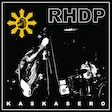 Apparently it’s short for “Red Horse Drunk Punks” (or “Red Horse Drugs Pancit”?), but whatever the case, this Filipino trio (by way of Virginia Beach) are aware of their name’s proximity to a certain strain of Chili Pepper. You can call your punk band Crede or Shone Tempo Violence all you want, but you only have yourself to blame if people associate you with similarly-monikered ’90s sleaze-rockers. Thankfully, that’s as far as RHDP’s alt-rock similarities go, as they prefer to rock in an aggressively boozed-up way, unfit for even the worst of Woodstocks. It’s a little too hardcore for the Nashville Pussy / Turbonegro set, but is it really? Especially if everyone is all coked up and playing Twister on the pool table? The indulgent guitar-soloing and high-octane rock moves call to mind the covered roster of Guns N’ Roses’ The Spaghetti Incident?, from Nazareth to Johnny Thunders, played heavier and more belligerently than the old guard. RHDP are way more Filipino, too – all of their songs are sung in Tagalog, though the fist-pumping and whiskey shots are a universally-shared vernacular. It’s fun on record, but I have the suspicion that the songs of Kaskasero are meant to be experienced live and in person. I can think of no better place to experience RHDP than a dive bar in Virginia Beach’s off-season, their speaker-popping hard-rock drowning out the depressingly constant procession of military aircraft above.
Apparently it’s short for “Red Horse Drunk Punks” (or “Red Horse Drugs Pancit”?), but whatever the case, this Filipino trio (by way of Virginia Beach) are aware of their name’s proximity to a certain strain of Chili Pepper. You can call your punk band Crede or Shone Tempo Violence all you want, but you only have yourself to blame if people associate you with similarly-monikered ’90s sleaze-rockers. Thankfully, that’s as far as RHDP’s alt-rock similarities go, as they prefer to rock in an aggressively boozed-up way, unfit for even the worst of Woodstocks. It’s a little too hardcore for the Nashville Pussy / Turbonegro set, but is it really? Especially if everyone is all coked up and playing Twister on the pool table? The indulgent guitar-soloing and high-octane rock moves call to mind the covered roster of Guns N’ Roses’ The Spaghetti Incident?, from Nazareth to Johnny Thunders, played heavier and more belligerently than the old guard. RHDP are way more Filipino, too – all of their songs are sung in Tagalog, though the fist-pumping and whiskey shots are a universally-shared vernacular. It’s fun on record, but I have the suspicion that the songs of Kaskasero are meant to be experienced live and in person. I can think of no better place to experience RHDP than a dive bar in Virginia Beach’s off-season, their speaker-popping hard-rock drowning out the depressingly constant procession of military aircraft above.
Emily Robb Soundtrack To The Space Between Attack And Decay LP (Petty Bunco)
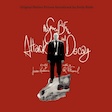 Film and TV soundtracking has become one of the few viable career paths available to creative musicians as of late. If Daniel Lopatin and Bobby Krlic aren’t driving around Los Angeles in Cybertrucks, it’s not because they can’t afford them. Emily Robb has now joined the growing ranks of indie artists with film soundtracks on their resumés, but like all of Robb’s recorded output thus far, this isn’t a bid for fame and fortune, it’s another excuse to make something cool with her friends. I haven’t seen The Space Between Attack And Decay, but I understand it to be a very limited-run indie film made by Philly people, some of whose names I recognize from around town. From spinning the soundtrack, it’s easy to grasp how Robb’s guitar-centric vignettes might converse with the film’s surreal scenes. Her solo work often favors a heads-down repetition, and while that’s not out of the equation, her musical colors have expanded from a strictly universal fuzz to folk, spaghetti westerns, garage-rock and Link Wray-abilly. If I’m reading it right, that’s Robb playing the drums and bass (see “Dance Music”) as necessary, no longer solely tethered to the guitar. As is the case with projects such as these, Robb was surely responding to prompts and requests from the film’s creators, but sometimes that’s how one arrives at their best creative work, taking the director’s inspiration and running with it. I know this much: I wish “Frustrated Wake Up” would softly play in the background whenever I wake up frustrated.
Film and TV soundtracking has become one of the few viable career paths available to creative musicians as of late. If Daniel Lopatin and Bobby Krlic aren’t driving around Los Angeles in Cybertrucks, it’s not because they can’t afford them. Emily Robb has now joined the growing ranks of indie artists with film soundtracks on their resumés, but like all of Robb’s recorded output thus far, this isn’t a bid for fame and fortune, it’s another excuse to make something cool with her friends. I haven’t seen The Space Between Attack And Decay, but I understand it to be a very limited-run indie film made by Philly people, some of whose names I recognize from around town. From spinning the soundtrack, it’s easy to grasp how Robb’s guitar-centric vignettes might converse with the film’s surreal scenes. Her solo work often favors a heads-down repetition, and while that’s not out of the equation, her musical colors have expanded from a strictly universal fuzz to folk, spaghetti westerns, garage-rock and Link Wray-abilly. If I’m reading it right, that’s Robb playing the drums and bass (see “Dance Music”) as necessary, no longer solely tethered to the guitar. As is the case with projects such as these, Robb was surely responding to prompts and requests from the film’s creators, but sometimes that’s how one arrives at their best creative work, taking the director’s inspiration and running with it. I know this much: I wish “Frustrated Wake Up” would softly play in the background whenever I wake up frustrated.
Sa Pa Ambeesh 2xLP (Short Span)
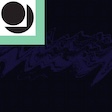 Need to keep a close eye on the Short Span label, as they delivered some of my favorite adventurous electronic music in 2025, and seem poised to continue in 2026. Case in point is the newest full-length from Sa Pa, which extrapolates on the European producer’s penchant for minimalist dub-techno, wandering further off the map. These tracks move past blurry impressionistic techniques and towards the surreal with a consistently refined style. I’m picturing paddle-boats churning forward over colorful pools, cleansing dust storms, one of those fat-ass neon caterpillars nimbly crawling out on a mossy branch… the imagined electronic sounds of environmental and natural processes that approach the uncanny. “EOALH (Pressure Rhythm)” thumps and slurps ardently, but eventually a melodic element seeps in like drops of watercolor on canvas. “With Or Without Wires” reminds me of those nature videos where they somehow stuff a hi-res camera deep into an ant colony (with hundreds of those lil’ freaks marching past), but also you might be able to dance to this, and if delivered with the appropriate sound system (all-encompassing low-end and crystal-clear highs), it might be the most memorable cut of the evening. Though I am certain that electronic wires and computer chips played pivotal roles in the creation of Ambeesh, there’s a rich organic quality to these tunes that lulls me in and holds me in place. “Blue”, in particular, feels like I’m receiving a topographic survey of an alien planet’s biosphere, no oxygen suit required.
Need to keep a close eye on the Short Span label, as they delivered some of my favorite adventurous electronic music in 2025, and seem poised to continue in 2026. Case in point is the newest full-length from Sa Pa, which extrapolates on the European producer’s penchant for minimalist dub-techno, wandering further off the map. These tracks move past blurry impressionistic techniques and towards the surreal with a consistently refined style. I’m picturing paddle-boats churning forward over colorful pools, cleansing dust storms, one of those fat-ass neon caterpillars nimbly crawling out on a mossy branch… the imagined electronic sounds of environmental and natural processes that approach the uncanny. “EOALH (Pressure Rhythm)” thumps and slurps ardently, but eventually a melodic element seeps in like drops of watercolor on canvas. “With Or Without Wires” reminds me of those nature videos where they somehow stuff a hi-res camera deep into an ant colony (with hundreds of those lil’ freaks marching past), but also you might be able to dance to this, and if delivered with the appropriate sound system (all-encompassing low-end and crystal-clear highs), it might be the most memorable cut of the evening. Though I am certain that electronic wires and computer chips played pivotal roles in the creation of Ambeesh, there’s a rich organic quality to these tunes that lulls me in and holds me in place. “Blue”, in particular, feels like I’m receiving a topographic survey of an alien planet’s biosphere, no oxygen suit required.
SnPLO Infinity Substance 12″ (Pin)
 There’s the techno influencer route, where you churn out a steady stream of performative social-media content loosely tied to your musical output, and then there’s the path SnPLO has chosen: self-release intriguingly-hermetic records with barely any info printed on them. This is yet another tightly-knit scene of German techno scrutinizers whose faces I may never see, their esoteric aliases collaborating and, in the case of SnPLO, morphing into something new. I understand SnPLO to be the teaming-up of SnP 500 and PLO Man, though these two cuts are starkly refined enough that they could’ve easily been the work of a solitary mind, neither undercooked nor overstuffed. The a-side (both tracks are cruelly untitled) volleys familiar dub-techno sounds across an endless concourse, with choppy hi-hat / clap simulations working overtime, hypnotizing and red-blooded. I prefer the scratchy, smeary b-side – its groove swells with druggy motion, as if the vinyl was pressed in an egg-like shape instead of a perfect circle. Both tracks prefer subconscious shifts to drops, builds or any sort of overt deviations, though the deeper you peer into them, the more you’ll realize the secretive action at hand. As is the case with many prime examples of unvarnished European techno, there’s a reward to leaning backwards and unfocusing your ears as well, the head-under-a-waterfall pleasure of macroscopic listening.
There’s the techno influencer route, where you churn out a steady stream of performative social-media content loosely tied to your musical output, and then there’s the path SnPLO has chosen: self-release intriguingly-hermetic records with barely any info printed on them. This is yet another tightly-knit scene of German techno scrutinizers whose faces I may never see, their esoteric aliases collaborating and, in the case of SnPLO, morphing into something new. I understand SnPLO to be the teaming-up of SnP 500 and PLO Man, though these two cuts are starkly refined enough that they could’ve easily been the work of a solitary mind, neither undercooked nor overstuffed. The a-side (both tracks are cruelly untitled) volleys familiar dub-techno sounds across an endless concourse, with choppy hi-hat / clap simulations working overtime, hypnotizing and red-blooded. I prefer the scratchy, smeary b-side – its groove swells with druggy motion, as if the vinyl was pressed in an egg-like shape instead of a perfect circle. Both tracks prefer subconscious shifts to drops, builds or any sort of overt deviations, though the deeper you peer into them, the more you’ll realize the secretive action at hand. As is the case with many prime examples of unvarnished European techno, there’s a reward to leaning backwards and unfocusing your ears as well, the head-under-a-waterfall pleasure of macroscopic listening.
Spatter Pattern Atomic Dinette 7″ (Mutated Pink Fuzz)
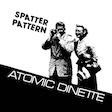 The band name, song title and label name are all phrases that could’ve been conjured up by Glenn Danzig in a Lodi, NJ basement circa 1979, which I presume is no unintentional coincidence. Spatter Pattern are a synth-punk trio from Kalamazoo, MI, and seeing as they decided to tackle Misfits’ classic “TV Casualty” on the b-side, it’s clear to which Fiend Club their allegiances lie. “Atomic Dinette” is conjured through two synth operators and one vocalist – no guitars – so it’s Ben Lyon’s exaggerated sneer and the unmerry, two-finger melodies that position this group in the realm of punk, not ‘wave. I could picture a punk band translating “Atomic Dinette” on guitars and drums quite easily, and with the chorus of “how will you survive in the blue mist”, I can practically feel the devilocks forming on their skull-painted heads. “TV Casualty” sounds pretty good through these B-movie synths and a twitching digital hi-hat, but that’s one of the joys of Misfits songs – they can be translated in any language, played on any instrument, and at the very worst, still sound kinda good. It’s only a quick taste of Atomic Dinette, but this is a punk forty-five, not a Tolstoy novel.
The band name, song title and label name are all phrases that could’ve been conjured up by Glenn Danzig in a Lodi, NJ basement circa 1979, which I presume is no unintentional coincidence. Spatter Pattern are a synth-punk trio from Kalamazoo, MI, and seeing as they decided to tackle Misfits’ classic “TV Casualty” on the b-side, it’s clear to which Fiend Club their allegiances lie. “Atomic Dinette” is conjured through two synth operators and one vocalist – no guitars – so it’s Ben Lyon’s exaggerated sneer and the unmerry, two-finger melodies that position this group in the realm of punk, not ‘wave. I could picture a punk band translating “Atomic Dinette” on guitars and drums quite easily, and with the chorus of “how will you survive in the blue mist”, I can practically feel the devilocks forming on their skull-painted heads. “TV Casualty” sounds pretty good through these B-movie synths and a twitching digital hi-hat, but that’s one of the joys of Misfits songs – they can be translated in any language, played on any instrument, and at the very worst, still sound kinda good. It’s only a quick taste of Atomic Dinette, but this is a punk forty-five, not a Tolstoy novel.
Spiritiste Excommunication Hymns LP (Protagonist Music / Tor Johnson)
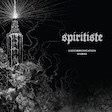 With screamo’s undeniable (and stupefying) resurgence, it was only a matter of time before I came across a new band like Baton Rouge’s Spiritiste. Their sound hearkens back to the era when screamo was more closely aligned with crusty hardcore than mall-metal, full of bands from ex-communist eastern European states who treated hardcore with a collective mindset (and if they’re lucky, North American distribution care of Ebullition). Portraits Of Past, One Eyed God Prophesy, Inept and Ananda come to mind, a blast-beat-free emotional hardcore sound full of the jagged drum beats and high-on-the-neck guitar parts that cause audience members to violently tap on the straps of the big backpacks they are inexplicably wearing at the show. Like the wave of screamo I’m describing, Spiritiste do not shy away from the political, directing their understandable rage towards a number of well-deserving targets, most directly expressed in “The Dead Travel Fast”. These songs aren’t as chaotic or thrilling as I generally like this sort of thing to be – I am an original Witching Hour Records Koffin Kids fan-club member, after all – but I am sure their friends are supportive, and that they provide a necessary function in the hardcore ecosystem of Baton Rouge. Real hardcore kids are needed everywhere.
With screamo’s undeniable (and stupefying) resurgence, it was only a matter of time before I came across a new band like Baton Rouge’s Spiritiste. Their sound hearkens back to the era when screamo was more closely aligned with crusty hardcore than mall-metal, full of bands from ex-communist eastern European states who treated hardcore with a collective mindset (and if they’re lucky, North American distribution care of Ebullition). Portraits Of Past, One Eyed God Prophesy, Inept and Ananda come to mind, a blast-beat-free emotional hardcore sound full of the jagged drum beats and high-on-the-neck guitar parts that cause audience members to violently tap on the straps of the big backpacks they are inexplicably wearing at the show. Like the wave of screamo I’m describing, Spiritiste do not shy away from the political, directing their understandable rage towards a number of well-deserving targets, most directly expressed in “The Dead Travel Fast”. These songs aren’t as chaotic or thrilling as I generally like this sort of thing to be – I am an original Witching Hour Records Koffin Kids fan-club member, after all – but I am sure their friends are supportive, and that they provide a necessary function in the hardcore ecosystem of Baton Rouge. Real hardcore kids are needed everywhere.
Te/DIS Impending Divulgence LP (Galakthorrö)
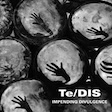 Four albums in and I’m starting to think that Te/DIS’s gloomy disposition is permanent. Maybe the sun never shines in Duisburg, Germany? Whatever the basis for Te/DIS’s somber outlook, it fits Galakthorrö like a black-leather opera glove. The label is highly selective with its stamp of approval, and Te/DIS has not strayed from the script since their debut EP a dozen years ago. Impending Divulgence might not be a crucial new work in that respect, but if you want dreary minimal-synth with an eerily-calm Dr. Frankenstein on vocals, look no further. This is music for bat caves (and clubs named The Bat Cave) and hidden libraries from the 1800s, or any concealed location where guano and dust accumulate equally. I appreciate how detached Te/DIS sounds when he sings, real pod-people emotion, which suits the similarly science-fictiony electro-industrial backdrop. Even on a track like “Your Truth My Lie”, where he actually sings a melody, it comes across like HAL 9000 attempting Depeche Mode karaoke. This is precisely what I want to hear from a tertiary Galakthorrö artist: electronic goth music fully committed to its own morbid fantasies.
Four albums in and I’m starting to think that Te/DIS’s gloomy disposition is permanent. Maybe the sun never shines in Duisburg, Germany? Whatever the basis for Te/DIS’s somber outlook, it fits Galakthorrö like a black-leather opera glove. The label is highly selective with its stamp of approval, and Te/DIS has not strayed from the script since their debut EP a dozen years ago. Impending Divulgence might not be a crucial new work in that respect, but if you want dreary minimal-synth with an eerily-calm Dr. Frankenstein on vocals, look no further. This is music for bat caves (and clubs named The Bat Cave) and hidden libraries from the 1800s, or any concealed location where guano and dust accumulate equally. I appreciate how detached Te/DIS sounds when he sings, real pod-people emotion, which suits the similarly science-fictiony electro-industrial backdrop. Even on a track like “Your Truth My Lie”, where he actually sings a melody, it comes across like HAL 9000 attempting Depeche Mode karaoke. This is precisely what I want to hear from a tertiary Galakthorrö artist: electronic goth music fully committed to its own morbid fantasies.
There There LP (Psychic Static)
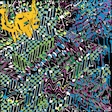 One of the interesting things about my micro-generation of hardcore kids – let’s say, those who are currently between the ages of 37 and 47 – never really stopped being in bands. Prior generations of punks took decades off, and some, in rare cases, actually stopped playing music, but there are just scores of any-gendered dudes out there like me who have been doing bands, old and new, since the turn of the century. Therein lies the rub: how do you keep it exciting or meaningful; how do you find a worthwhile path forward into this unavoidably middle-aged underground? Sometimes a new band is the way to go, as is the case with There, featuring ex-personnel from Arab On Radar, Doomsday Student, Athletic Automaton and The Cancer Conspiracy. That’s a Providence post-hardcore pedigree if there ever was one, and There take what they already know how to do and apply it to this slightly new configuration. As you might imagine, the guitars chase you like bees over booming, untraditional drum patterns, as bassist / synth-player Josh Kemp vocalizes in a way as to suggest he might be losing his mind a little. They throw in the occasional blast-beat for good measure, but it’s the side-long closer “The Famous Handsome Actor” that I find most intriguing, which points to the question of “if Klaus Schulze managed Racebannon in the early ’00s, who’s paying the weed dealer?”.
One of the interesting things about my micro-generation of hardcore kids – let’s say, those who are currently between the ages of 37 and 47 – never really stopped being in bands. Prior generations of punks took decades off, and some, in rare cases, actually stopped playing music, but there are just scores of any-gendered dudes out there like me who have been doing bands, old and new, since the turn of the century. Therein lies the rub: how do you keep it exciting or meaningful; how do you find a worthwhile path forward into this unavoidably middle-aged underground? Sometimes a new band is the way to go, as is the case with There, featuring ex-personnel from Arab On Radar, Doomsday Student, Athletic Automaton and The Cancer Conspiracy. That’s a Providence post-hardcore pedigree if there ever was one, and There take what they already know how to do and apply it to this slightly new configuration. As you might imagine, the guitars chase you like bees over booming, untraditional drum patterns, as bassist / synth-player Josh Kemp vocalizes in a way as to suggest he might be losing his mind a little. They throw in the occasional blast-beat for good measure, but it’s the side-long closer “The Famous Handsome Actor” that I find most intriguing, which points to the question of “if Klaus Schulze managed Racebannon in the early ’00s, who’s paying the weed dealer?”.
Ugne & Maria Zotasphere LP (Hands In The Dark)
 I enjoyed Ugne Uma’s recent EP so much that I vowed to check out any and all musical Ugnes I might come across. So far it’s a move that’s paying off, as this new collab album between Ugne Vyliaudaite and Marija Rasa Kudabaitė is a choice dip into the electro-abyss. Together, these two operate in a melting-pot of downtempo moves I’d associate with the Stroom label. Dub-techno, new-age, trip-hop, ambient, dubstep, experimental… Ugne & Maria throw so many colors in the mix that it becomes something else entirely, beholden to none of its individual parts. This results in mostly-instrumental electronic beats that move at their own pace, with keys, pads, chords and strings connected by the thin layer of syrup they’ve been doused in. I’d take you directly to “Xmas Rec”, a downtempo stepper tilted on its axis, full of intrigue and cushioned by five stubby bass notes, but I’d want you to stay for “I Contain Multitudes” too, which sounds like an inebriated Lolina messing with Porter Ricks tracks in your isolation-tank headphones, cartoon fragments of dance music bubbling up all around. At first listen, it kind of felt like a mess to me, albeit a highly enjoyable one; while the satisfying background-music appeal of Zotasphere hasn’t dissipated after repeated listens, I think I’m starting to grasp Ugne & Maria’s puzzle-logic.
I enjoyed Ugne Uma’s recent EP so much that I vowed to check out any and all musical Ugnes I might come across. So far it’s a move that’s paying off, as this new collab album between Ugne Vyliaudaite and Marija Rasa Kudabaitė is a choice dip into the electro-abyss. Together, these two operate in a melting-pot of downtempo moves I’d associate with the Stroom label. Dub-techno, new-age, trip-hop, ambient, dubstep, experimental… Ugne & Maria throw so many colors in the mix that it becomes something else entirely, beholden to none of its individual parts. This results in mostly-instrumental electronic beats that move at their own pace, with keys, pads, chords and strings connected by the thin layer of syrup they’ve been doused in. I’d take you directly to “Xmas Rec”, a downtempo stepper tilted on its axis, full of intrigue and cushioned by five stubby bass notes, but I’d want you to stay for “I Contain Multitudes” too, which sounds like an inebriated Lolina messing with Porter Ricks tracks in your isolation-tank headphones, cartoon fragments of dance music bubbling up all around. At first listen, it kind of felt like a mess to me, albeit a highly enjoyable one; while the satisfying background-music appeal of Zotasphere hasn’t dissipated after repeated listens, I think I’m starting to grasp Ugne & Maria’s puzzle-logic.
Unidad Ideológica Choque Asimétrico LP (La Vida Es Un Mus)
 Essentially a law of nature at this point, Colombian punk and metal simply goes harder than anywhere else. Where else could the Imagen seven-inch, or Parabellum’s Sacrilegio have come from? Nowhere, that’s where. Unidad Ideológica hit the global scene in 2021 care of the ever-prescient La Vida Es Un Mus label, and Choque Asimétrico is their follow-up full-length. Much like its psychedelically horrifying cover art, this album rages with an injurious fury, the sound of what the kids call “crashing out” at breakneck speed. Imagine those self-titled Die Kreuzen songs as performed by The Shitlickers: bass-driven, frenzied progressions captured in a molten-hot recording that jumps out of the speakers. We get a moment of respite with the opening moments of fourth track “Huir”, but it’s short-lived – violent pogoing has kicked up all the dust on the floor and we can no longer see or breathe. “Colapso” is unsafely fast, cramming more notes in its close quarters than your average technical death-metal group, yet delivered with Framtid’s gale force. If these songs were less defined or memorable, the whole thing could blend together in an overwhelming blur, but Unidad Ideológica are too tight and in control to let that happen – they want you to experience every brutal detail with clarity, bearing full witness to your own demise.
Essentially a law of nature at this point, Colombian punk and metal simply goes harder than anywhere else. Where else could the Imagen seven-inch, or Parabellum’s Sacrilegio have come from? Nowhere, that’s where. Unidad Ideológica hit the global scene in 2021 care of the ever-prescient La Vida Es Un Mus label, and Choque Asimétrico is their follow-up full-length. Much like its psychedelically horrifying cover art, this album rages with an injurious fury, the sound of what the kids call “crashing out” at breakneck speed. Imagine those self-titled Die Kreuzen songs as performed by The Shitlickers: bass-driven, frenzied progressions captured in a molten-hot recording that jumps out of the speakers. We get a moment of respite with the opening moments of fourth track “Huir”, but it’s short-lived – violent pogoing has kicked up all the dust on the floor and we can no longer see or breathe. “Colapso” is unsafely fast, cramming more notes in its close quarters than your average technical death-metal group, yet delivered with Framtid’s gale force. If these songs were less defined or memorable, the whole thing could blend together in an overwhelming blur, but Unidad Ideológica are too tight and in control to let that happen – they want you to experience every brutal detail with clarity, bearing full witness to your own demise.
Lou Venturini Fuck Composure LP (Accidental Meetings)
 Another label I’d like to put on your radar is Accidental Meetings out of the UK. They’re a “label / party / podcast”, to be precise, and the music they release generally hovers in bass / dub / reggae territory, albeit appealingly skewed visions of such. I could happily bask in the humidity of Tokio Ono’s “Onion Soup Dub” until the spring flowers bloom, but before it gets away from me I want call this incredible twelve-inch from Lou Venturini to your attention. It’s a hard one to pinpoint, or even describe, which of course is grounds for excitement over here. Unintentional, digitally-abetted no-wave? Early Animal Collective turned IDM? Neither is quite right, especially when a track like “Stretch His Face” sounds like the best version of Butthole Surfers, or the early Primus demo that only exists in my dreams. There’s a lot of fast-fingered guitar, sometimes in acknowledgement of both dance music and Radiohead (say, “I Persevere”), and often in a manner similar to Glen Schenau’s excellent Nusidm. Venturini never lets the songs breathe, however, always tweaking and withering and spiraling parts in unintuitive ways. “Put Your Ear Near Mine” carries The Fall’s legacy beautifully, replete with electroshock vocal squeals. In earlier centuries, society would’ve quickly concluded that Venturini’s a madman and either exalted or executed him, but in our era he’s able to quietly release a small press-run of vinyl records for those lucky enough to stumble upon them.
Another label I’d like to put on your radar is Accidental Meetings out of the UK. They’re a “label / party / podcast”, to be precise, and the music they release generally hovers in bass / dub / reggae territory, albeit appealingly skewed visions of such. I could happily bask in the humidity of Tokio Ono’s “Onion Soup Dub” until the spring flowers bloom, but before it gets away from me I want call this incredible twelve-inch from Lou Venturini to your attention. It’s a hard one to pinpoint, or even describe, which of course is grounds for excitement over here. Unintentional, digitally-abetted no-wave? Early Animal Collective turned IDM? Neither is quite right, especially when a track like “Stretch His Face” sounds like the best version of Butthole Surfers, or the early Primus demo that only exists in my dreams. There’s a lot of fast-fingered guitar, sometimes in acknowledgement of both dance music and Radiohead (say, “I Persevere”), and often in a manner similar to Glen Schenau’s excellent Nusidm. Venturini never lets the songs breathe, however, always tweaking and withering and spiraling parts in unintuitive ways. “Put Your Ear Near Mine” carries The Fall’s legacy beautifully, replete with electroshock vocal squeals. In earlier centuries, society would’ve quickly concluded that Venturini’s a madman and either exalted or executed him, but in our era he’s able to quietly release a small press-run of vinyl records for those lucky enough to stumble upon them.
Al Wootton Glorias 12″ (Lith Dolina)
 Hell of a 2025 for Al Wootton, who has firmly established himself as one of the UK’s finest purveyors of creative rhythmic electronics. He’s as curious as we are, finding fresh ways to utilize the appealing properties of dub, post-punk, techno, cold-wave, what have you, and this new Glorias EP furthers his exceptional run. The premise is such: Wootton utilizes “minute samples of pieces by composers who were exiled from Franco’s Spain after the Spanish Civil War and field recordings of the Spanish countryside”. The resulting torn-edge collages are layered over an understated techno pulse on “Glorias”, the vibrant strings poking like sunlight through a bullethole-riddled canvas tent. It’s enthralling, alluring music that does not require the backstory to satisfy, but there’s no denying that the work is enhanced when you imagine the courageous anti-fascist composers who refused to snuff out their musical beauty in obedience. The b-side offers both a “Drums Version” and a “Drumless Version”, and I heartily recommend both – “Glorias (Drums Version)” lets the party take the wheel, whereas “Glorias (Drumless Version)” is messy-ambient par excellence, a gorgeous portal between the future and the past.
Hell of a 2025 for Al Wootton, who has firmly established himself as one of the UK’s finest purveyors of creative rhythmic electronics. He’s as curious as we are, finding fresh ways to utilize the appealing properties of dub, post-punk, techno, cold-wave, what have you, and this new Glorias EP furthers his exceptional run. The premise is such: Wootton utilizes “minute samples of pieces by composers who were exiled from Franco’s Spain after the Spanish Civil War and field recordings of the Spanish countryside”. The resulting torn-edge collages are layered over an understated techno pulse on “Glorias”, the vibrant strings poking like sunlight through a bullethole-riddled canvas tent. It’s enthralling, alluring music that does not require the backstory to satisfy, but there’s no denying that the work is enhanced when you imagine the courageous anti-fascist composers who refused to snuff out their musical beauty in obedience. The b-side offers both a “Drums Version” and a “Drumless Version”, and I heartily recommend both – “Glorias (Drums Version)” lets the party take the wheel, whereas “Glorias (Drumless Version)” is messy-ambient par excellence, a gorgeous portal between the future and the past.

